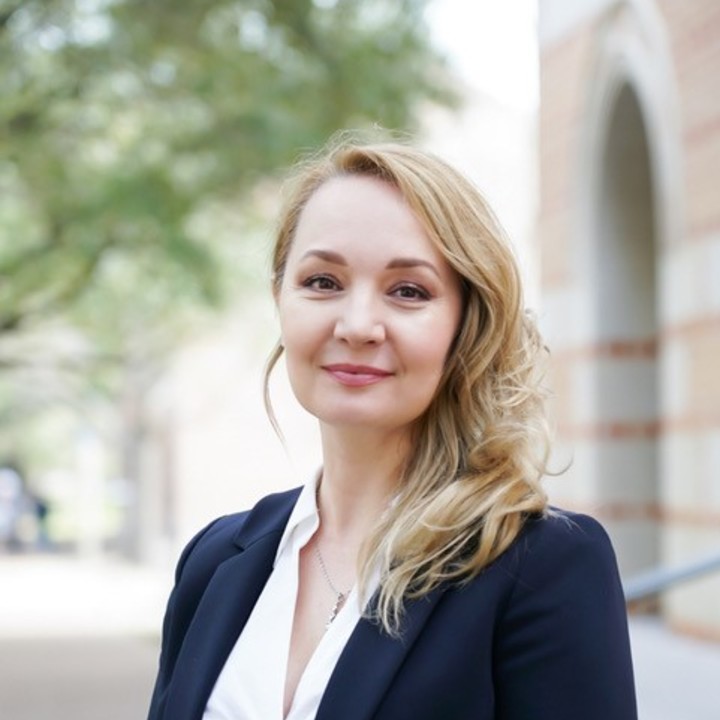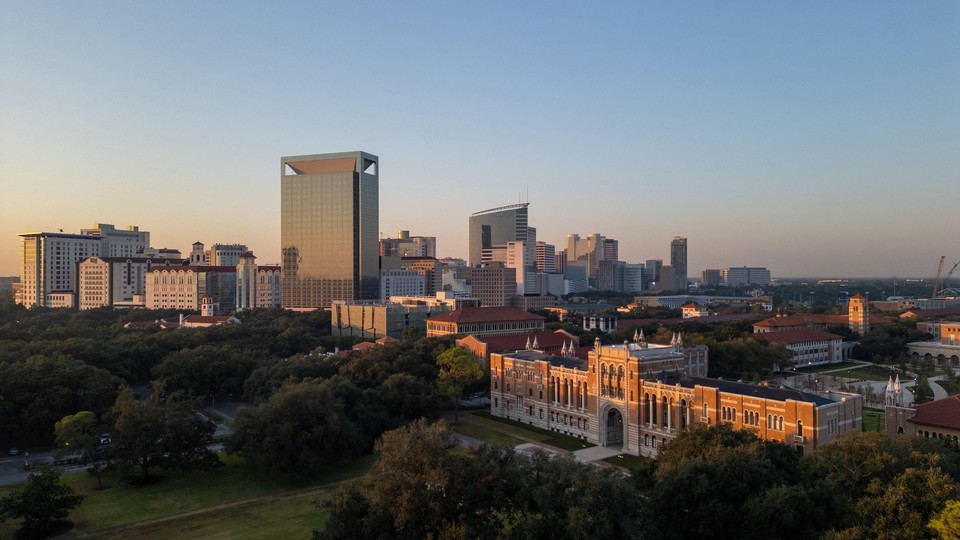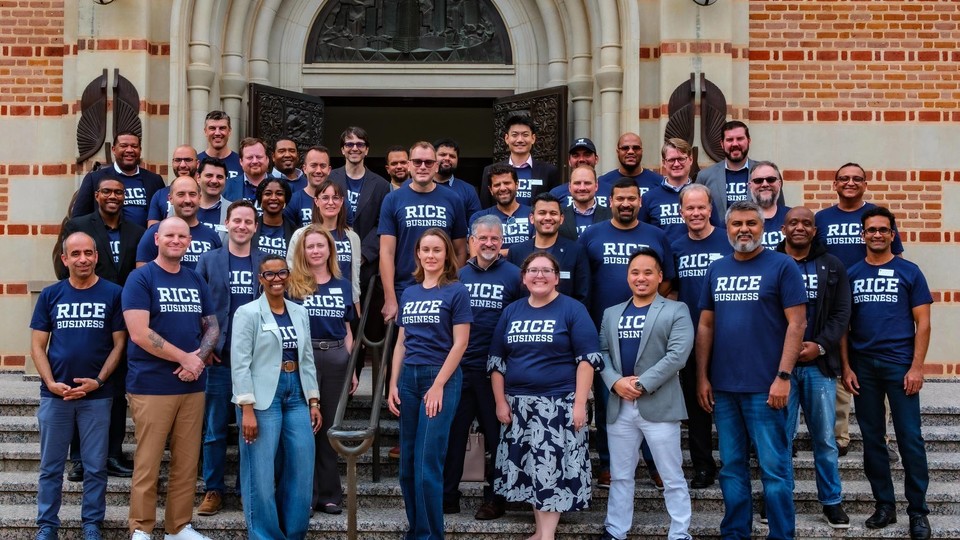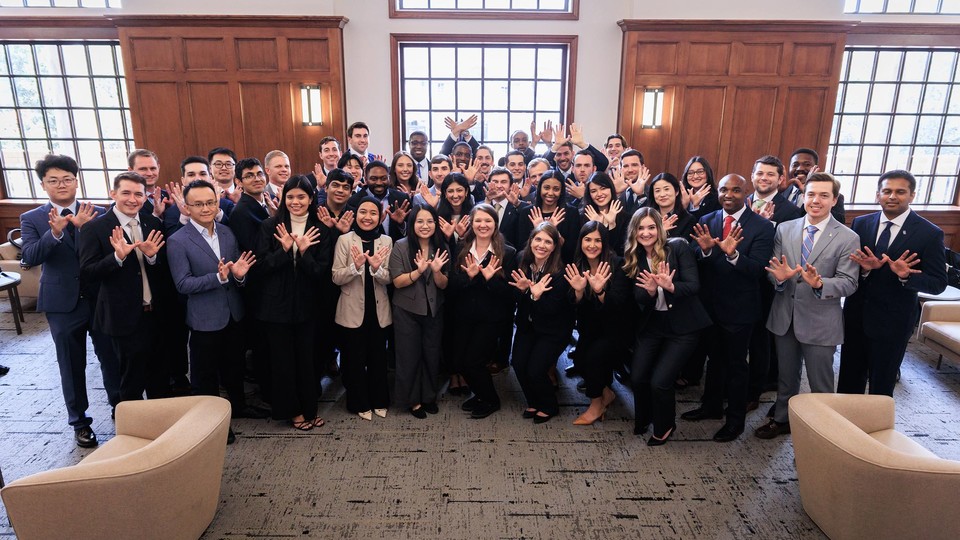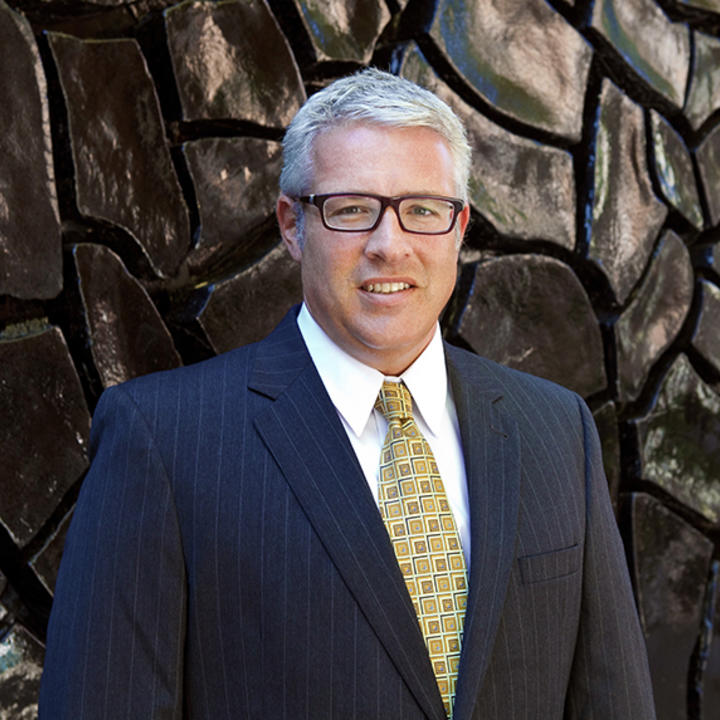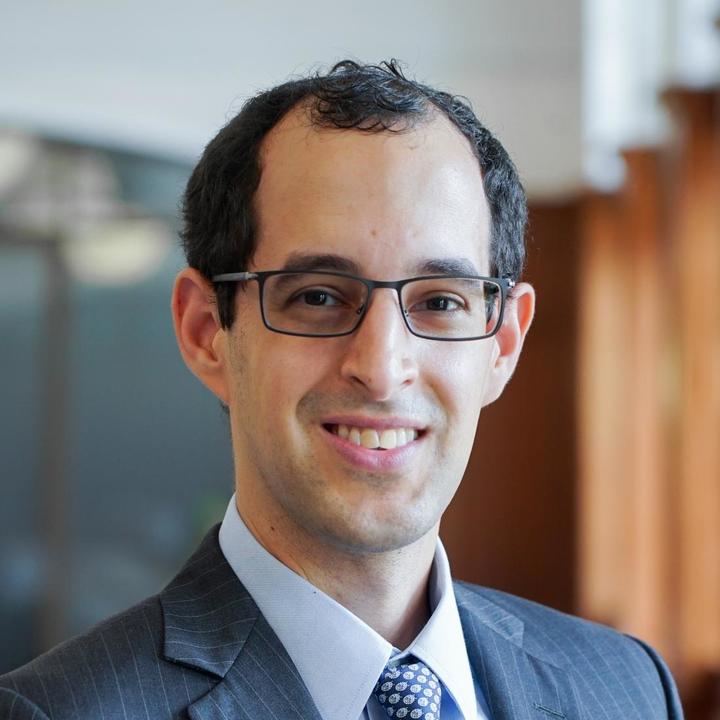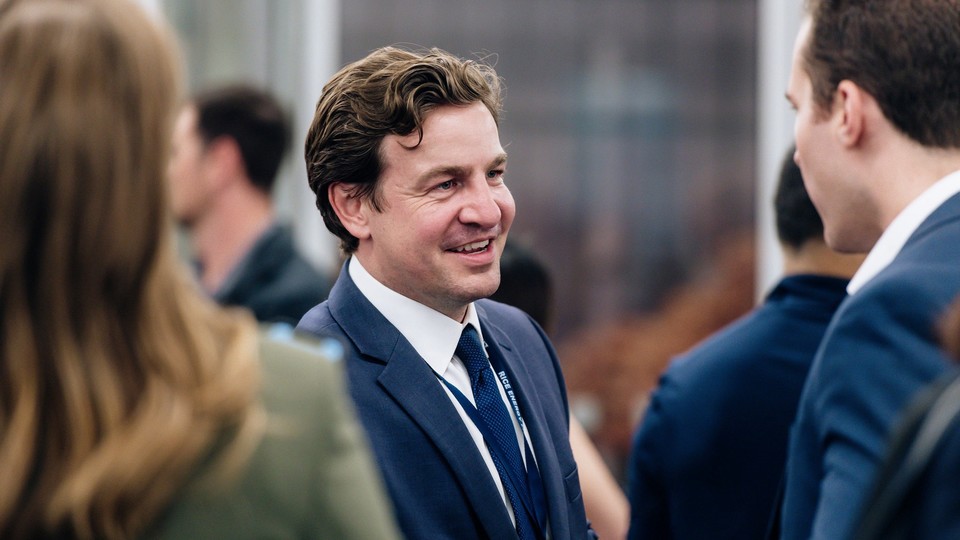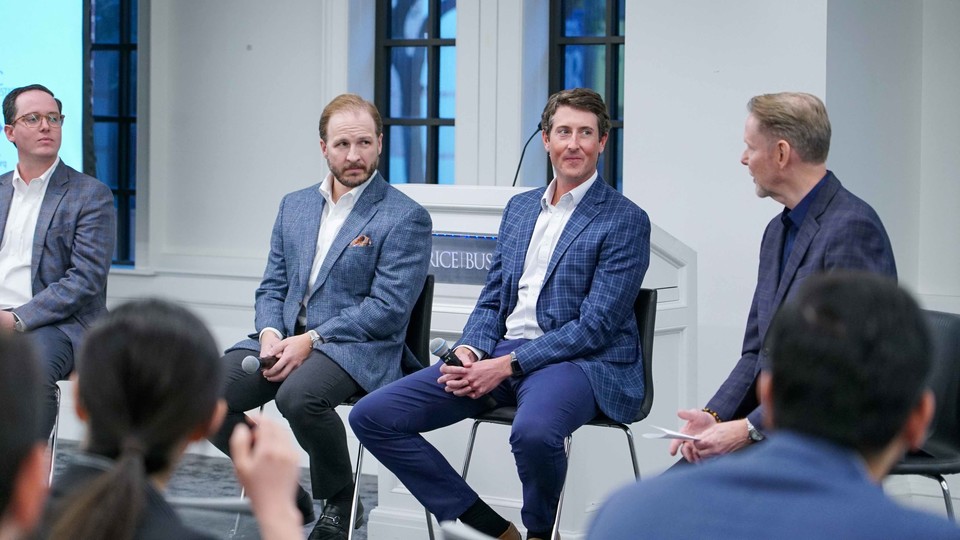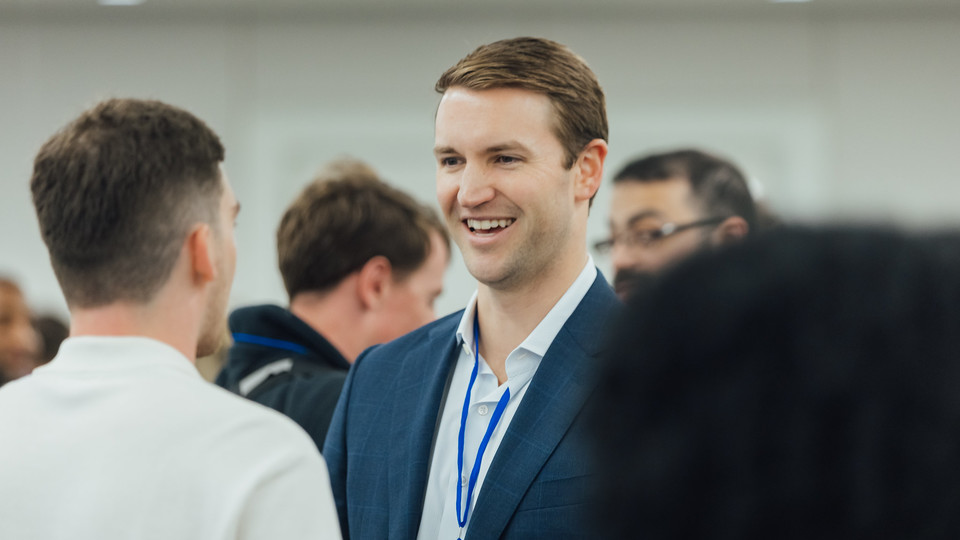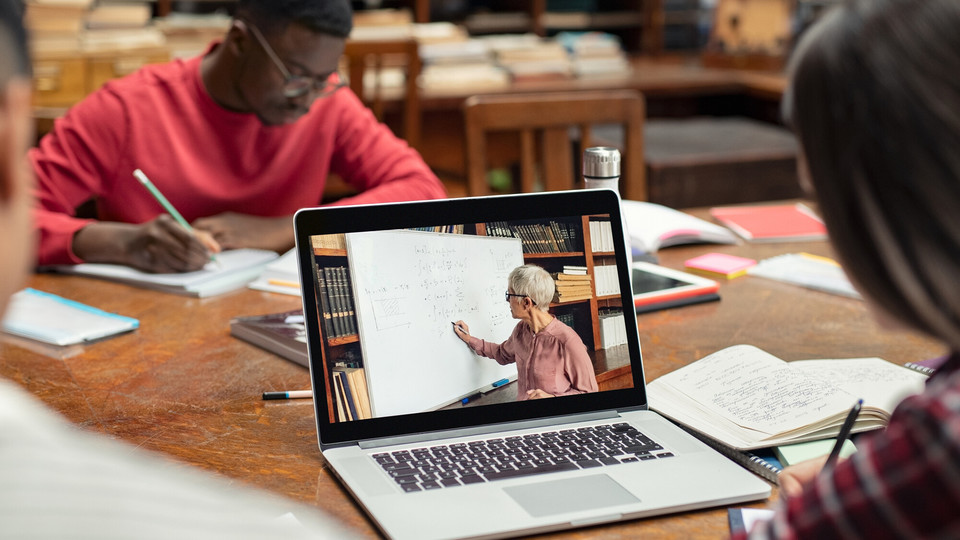Associate Professor of Strategic Management
When Scandal Strikes, Which Rituals Survive?
In the wake of scandal, organizations face a critical question: who will stay committed and who will leave? The answer depends largely on what type of institutional events people attend — and how far the scandal spreads.


Based on research by Anastasiya Zavyalova (Rice Business) and Bryan K. Stroube (London Business School)
Key findings:
- Community-wide events initially prove more resilient than personal celebrations.
- Widespread scandal changes everything. When misconduct spreads across multiple branches, even the most committed members begin abandoning core activities.
- Older, larger institutions lose fewer people, suggesting that established communities have greater resilience to scandal.
When scandal hits a company, members can respond in vastly different ways. Some employees will quit and some customers will walk away; others will stay engaged and defend their loyalty.
The question is: What separates those who stay from those who leave? And how do different circumstances — like the scale of the crisis or how far it spreads — shape those choices?
Drawing on detailed records in the wake of the Catholic Church’s child abuse scandal, researchers Anastasiya Zavyalova (Rice Business) and Bryan K. Stroube (London Business School) analyzed two decades of member engagement data to understand how different types of rituals can help organizations weather a scandal.
To answer those questions, the study looks not at press releases or crisis messaging, but at what organizations do — the rituals they use — to mark evidence of community rupture, responsibility and renewal.
Two Types of Organizational Rites
In their study, published in Organization Science, Zavyalova and Stroube identify two fundamental categories of member-engagement events: “rites of integration” and “rites of passage.”
Rites of integration are the recurring events that build community identity — monthly town halls, company-wide off-sites or, in the context of this study, weekly worship services. These events continuously reinforce shared values and attract an organization’s most committed members: lifelong members, parish-council regulars, office culture boosters, volunteers who stay late to lock up.
Rites of passage mark individual milestones — retirement and promotion celebrations, for instance; or, in the religious world, weddings, baptisms and funerals. Because these events mark a transition in a single individual's life, they attract a wider circle of engagement, including members who rarely attend rites of integration that have more to do with community identity.
The research demonstrates that regular, low-stakes community events create psychological and social infrastructure that can withstand crisis — at least initially.
Context: Archdiocese of Philadelphia
The Catholic Archdiocese of Philadelphia provided an ideal research setting for Zavyalova and Stroube because of its unusually detailed attendance records, as well as the scandal’s well-documented timeline. In 2002, when The Boston Globe exposed widespread abuse in the Catholic Church, investigations spread nationwide, including to Philadelphia where registered Catholics represented nearly 30% of the metro area’s population.
The researchers analyzed parish-level data from 1990-2010, tracking attendance at Sunday Mass (rites of integration) alongside participation in weddings, baptisms and funerals (rites of passage). This comprehensive dataset, spanning the scandal’s emergence and aftermath, revealed how different types of community engagement respond to organizational crisis.
To isolate the scandal’s effects, the study controlled for demographics, economic conditions and seasonal variations that might independently affect church attendance. The researchers also compared parishes with accused priests to those without direct involvement, creating natural control groups within the same archdiocese.
How Scandal Reshapes Community Participation
The data revealed two distinct patterns of response. Overall, rites of passage suffered more than rites of integration. That is, rates of baptisms, weddings and funerals declined more than Sunday Mass attendance, especially in parishes with accused priests.
This pattern reflects the different psychological investments these events represent. Core members who attend weekly services have the organization woven into their identity, making immediate withdrawal difficult despite moral concerns. Meanwhile, families planning weddings or baptisms — events that can be relocated — quickly sought alternatives when misconduct emerged on a local level.
However, if the scandal spread to neighboring parishes, this pattern reversed dramatically. Sunday Mass attendance began declining more steeply than milestone events. Once the scandal became system-wide rather than isolated, even the most devoted members started questioning their organizational ties.
“When scandals crop up at nearby branches, the issue feels more severe to core members,” explains Zavyalova. “Once several neighboring branches of the organization are implicated, ignoring or excusing the misconduct becomes nearly impossible.”
Most likely, Zavyalova explains, parishioners attending weekly Mass identified more highly with their parish and felt connected to the community than members who only held a wedding or baptism. “Members who feel deeply connected to the organization have it woven into their identities, so walking away is much harder.”
Another interesting thing happened as the scandal spread: core members pulled back even more sharply than the peripheral members who, perhaps seeing every parish as equally tainted, continued holding their personal ceremonies.
Were there any exceptions to this pattern? Yes. At older and larger parishes, Sunday Mass attendance was more resilient — perhaps because the psychological and identity-related associations of core members were strongest within these communities.
The Broader Implications for Business
These findings offer crucial insights for any organization building resilience to scandal. The research demonstrates that regular, low-stakes community events create psychological and social infrastructure that can withstand crisis — at least initially.
Of course, Sunday Mass carries more spiritual, historical and social weight than any office holiday party or lunch-and-learn. Nevertheless, the study shows that rituals designed to build community — whether sacred or secular — follow similar engagement patterns when scandal strikes.
Organizations should invest in consistent rites of integration long before trouble emerges. Weekly all-hands meetings, cross-departmental volunteer projects, regular social gatherings, alumni reunions and informal traditions build the shared identity that helps communities weather scandal’s first impact. These events also provide natural platforms for leadership communication and collective problem-solving when crisis strikes.
However, the research also reveals the limits of community loyalty. As misconduct spreads across an organization, even the most committed members will eventually withdraw from core activities. This suggests that preventing scandal spread — through rapid response, transparent investigation and decision action — is more critical than simply building strong community bonds.
The paper also highlights how organizational characteristics influence scandal resilience. Larger, more established organizations have natural advantages in crisis management, possibly due to greater resources, more diverse member bases or stronger institutional traditions. Newer or smaller organizations, like startups, may need to invest more deliberately in community-building activities to achieve the same level of resilience.
Catholic Church, while unique in its spiritual and historical dimensions, reveals universal patterns in how communities respond to scandal. By understanding these dynamics, leaders can build more resilient organizations and respond more effectively when it strikes.
Written by Katie Gilbert
Stroube and Zavyalova (2025). “The Relative Effects of a Scandal on Member Engagement in Rites of Integration and Rites of Passage: Evidence from a Child Abuse Scandal in the Catholic Archdiocese of Philadelphia,” Organization Science.
Associate Professor of Strategic Management
Never Miss A Story
You May Also Like
Keep Exploring
This 19-Year-Old Is Whipping Up Acai Bowls and Smoothies Downtown
Ivan Diaz is a full time student studying business at Rice University and the owner of Oasis, a concept that offers acai bowls and smoothies in the Lyrics market. “I don’t think age really defines what you can and cannot do,” he says.
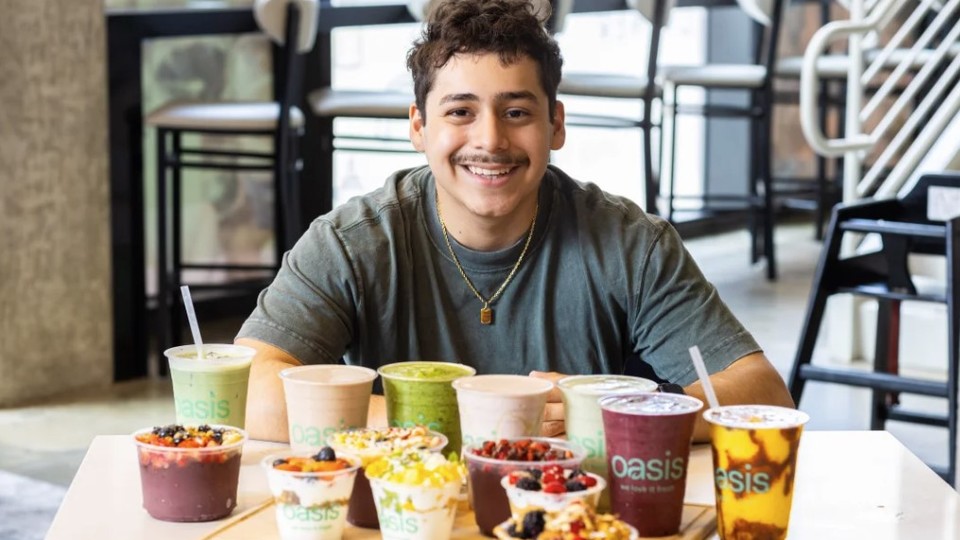
Real Humans of McKinsey: David Jaurrieta ’24
David Jaurrieta ’24 shares his journey to becoming an associate at McKinsey & Co. He talks about the value of community, shines a light on the importance of commitment and more.
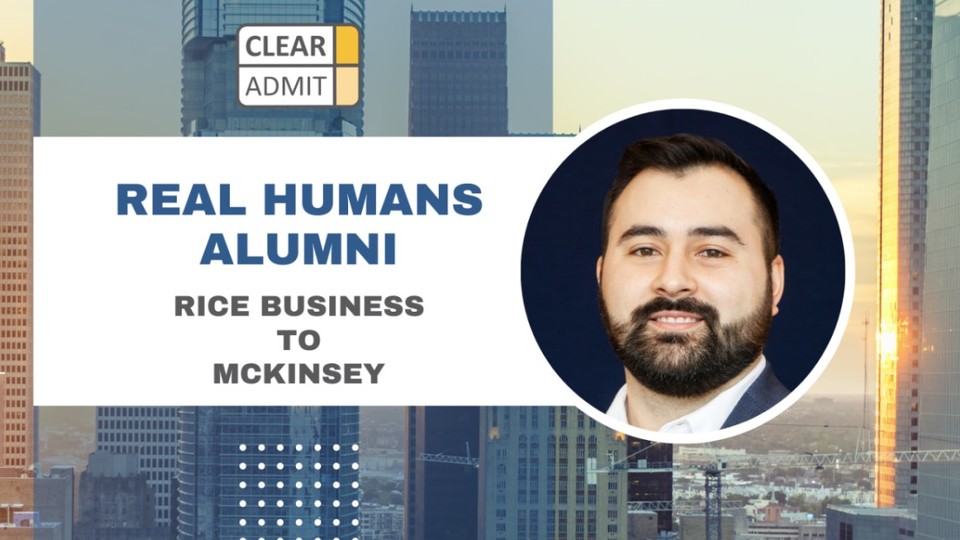
What Is an Executive MBA — and Is It Worth It?
What makes the Executive MBA so valuable? Learn how this flexible, high-impact degree empowers experienced professionals to lead or pivot — and go further in their careers.
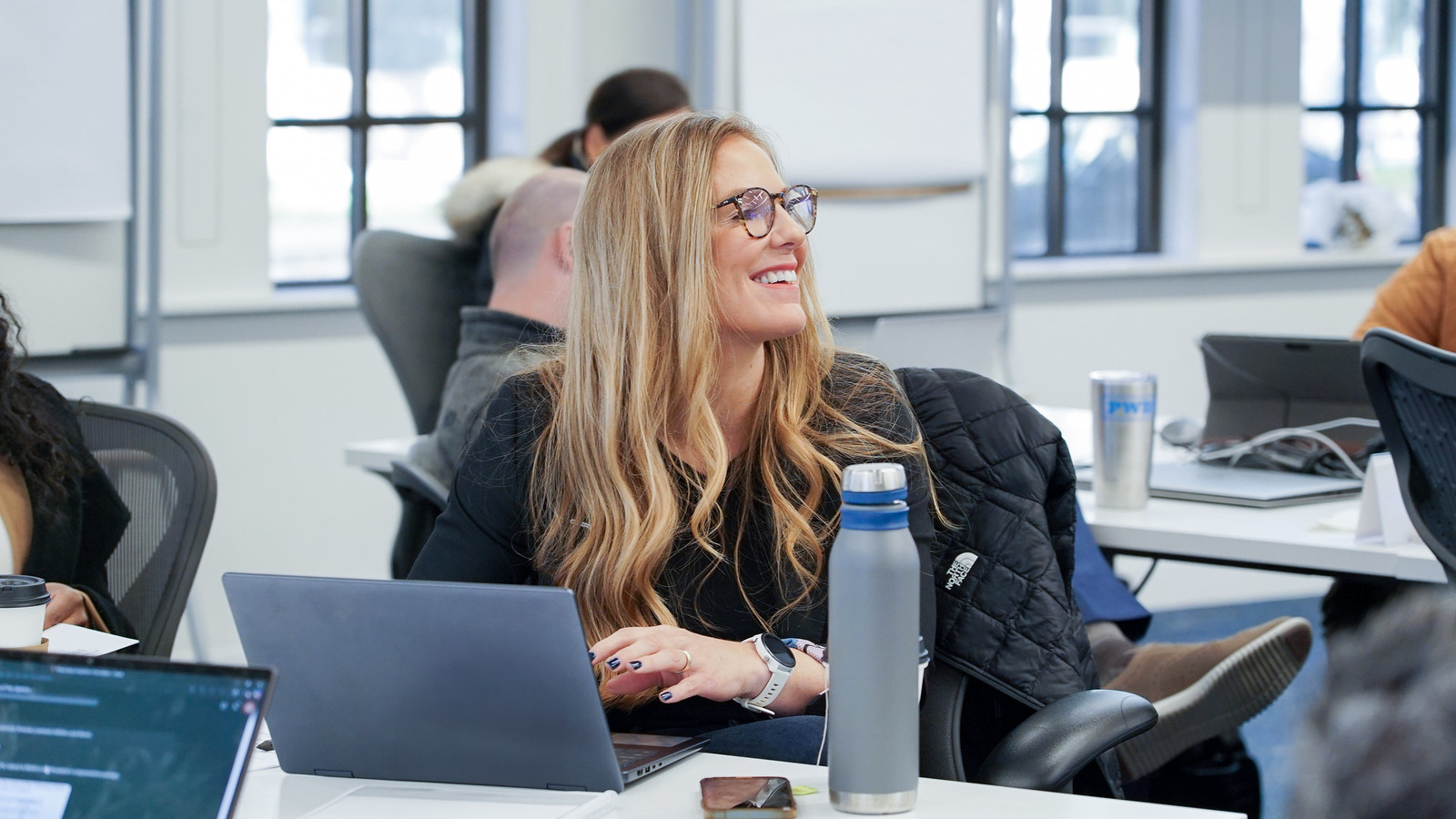
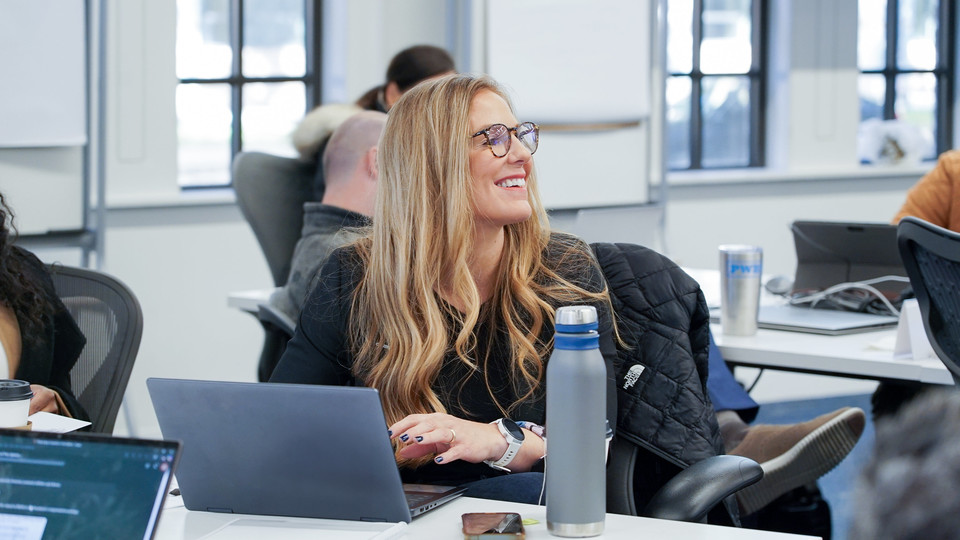
If you’re a mid-career pro, you could be eyeing the C-suite, a career pivot, or the start of your own venture. You might also be wondering whether an Executive MBA could help you get there.
If that sounds like you, you’re in good company. For many professionals, an Executive MBA isn't just a smart option — it’s a strategic career move with long-term payoffs.
What Sets an EMBA Apart From Other MBA Programs?
Executive MBA programs (EMBA) differ from a traditional full-time MBA and other working professional MBAs in a few key ways:
- Classes — structured to work around your career, scheduled on weekends or in short intensive blocks.
- Curriculum — zeroes in on senior-level leadership and strategy, rather than entry-level fundamentals.
- Student peers — managers and executives who bring years of real-world experience to the program.
This last point about the EMBA class profile is probably the most notable. At Rice Business, the typical Executive MBA student brings:
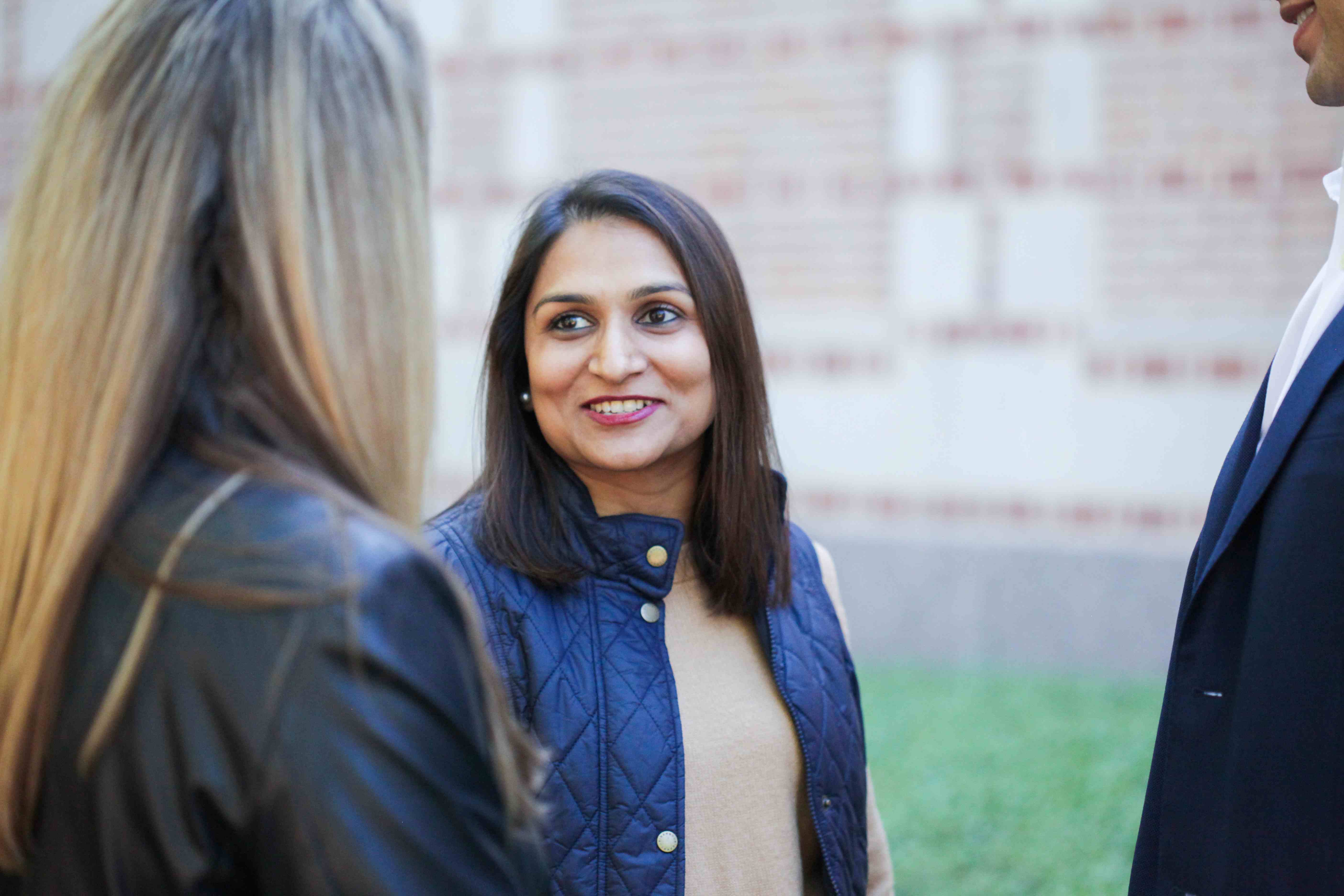
- 15-plus years of professional experience
- 5-plus years in management or executive roles
- A drive to sharpen their leadership skills and executive presence
At its core, EMBA programs are built for professionals who are already leading at work — and are ready for what’s next. It’s not a pause in your career; it’s a way to deepen your expertise, expand your network, and position yourself for bigger opportunities without stepping away from your current role.
Interested in Rice Business?
The Rice EMBA, at a Glance
Rice’s STEM-certified EMBA program takes 22 months to complete — giving students time to build a strong foundation in core business fundamentals; explore electives tailored to their interests; and strengthen their leadership skills through hands-on experience.
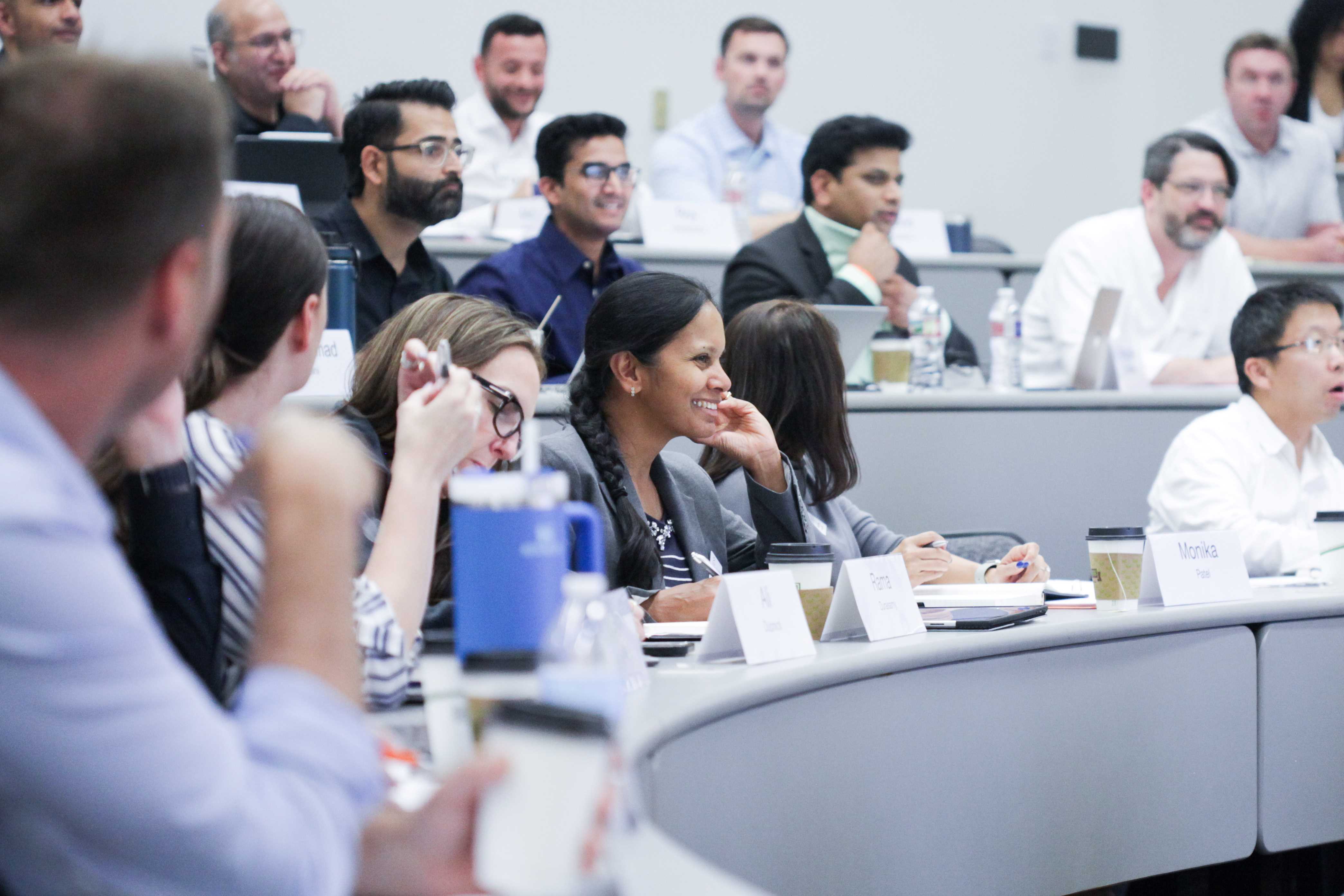
The Rice Business EMBA includes:
- Core courses in corporate finance, strategic marketing and business analytics
- 100-plus electives to choose from (depending on your schedule), such as “Entrepreneurship in Biotech” and “Corporate Rivalry”
- Personalized executive coaching and intensive leadership development
- A Global Field Experience that builds problem-solving skills in an international setting
Our cohort-based model meets two weekends per month, fostering close connections among classmates and a professional network that lasts long after graduation.
The ROI of the Rice EMBA
Rice EMBA students don’t just learn from top faculty — they learn from each other. The program pairs personalized leadership coaching with a diverse, experienced peer group that brings real-world insight into every discussion.
And the return on investment goes beyond the classroom, with lasting benefits like:
- Career growth. Step into C-suite roles like CEO and COO, or make a confident pivot into a new industry.
- Lifelong learning. Continue to grow by auditing courses as an alum.
- Entrepreneurial mindset. Launch your own venture with tools from the nation’s No. 1 Graduate Entrepreneurship Program.
- Network expansion. Build lasting connections with peers and industry leaders across sectors.
Houston: The Ideal EMBA Destination
Houston isn’t just the energy capital of the world — it’s also one of the fastest-growing and most diverse business hubs in the country. With two major airports and a central U.S. location, Houston offers easy access to global markets.

As a Rice EMBA student, you’ll tap into premier events and insights across industries like energy, tech and healthcare. Our home base, McNair Hall, sits minutes from the world’s largest medical complex and is within reach of the second-highest concentration of Fortune 500 headquarters in the nation.
Whether you're aiming to rise within your company or launch a new venture, Houston’s business ecosystem connects you directly to industry leaders, global perspectives and high-growth opportunities.
And when class is over? There’s always something happening in Space City.
Where Can the Rice Executive MBA Take You?
The Rice EMBA is built to help you apply what you learn right away — so you can make an impact in your current role while preparing for what’s next. Along the way, you’ll gain a close-knit network of peers and mentors you can rely on for years to come.
If you’re an experienced professional ready to lead at a higher level, the Rice EMBA could be the next step.
You May Also Like
Keep Exploring
Investing in Ideas You Believe in feat. Ben Mayberry ’76
Season 5, Episode 8
A seasoned entrepreneur, investor and mentor, Ben discusses his incredible career journey, approach to mentoring entrepreneurs, and the many lessons he's learned over the past 50 years.
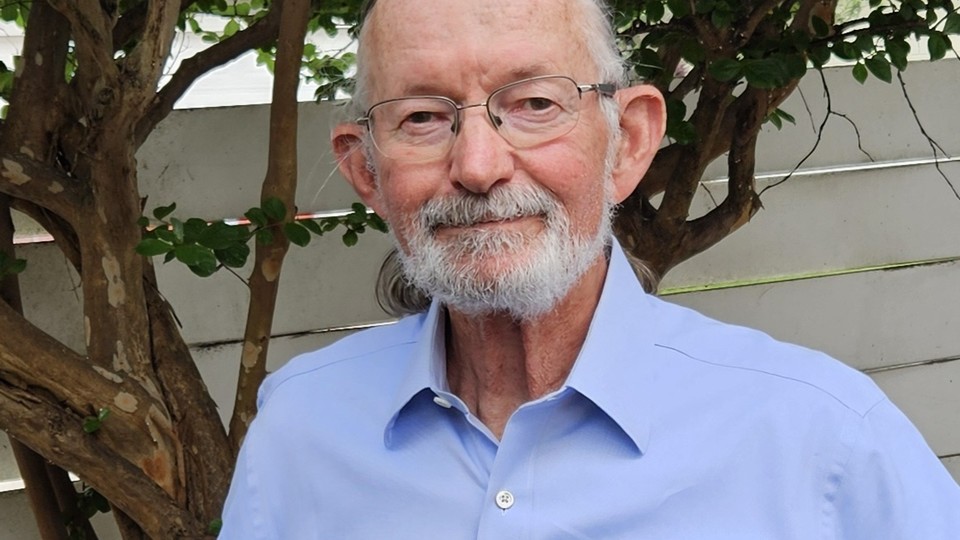
Owl Have You Know
Season 5, Episode 8
As a seasoned entrepreneur, investor and mentor, Ben Mayberry ’76 has seen a lot of change in the Houston business sector over the last 50 years.
Beginning his career in the technology sector, Ben went on to co-found companies like BSG and Winston Sage, and has been deeply involved in the Rice Business community through mentorship and recruiting. Ben has also served as the president of the Rice Alumni Association and has been a judge in the Rice Business Plan Competition for two decades.
Ben joins Owl Have You Know co-host Brian Jackson ‘21 to discuss his incredible career journey, commitment to Rice, involvement in the Houston Angel Network, approach to mentoring entrepreneurs, and the many lessons he’s learned over the course of his 50-year career.
Subscribe to Owl Have You Know on Apple Podcasts, Spotify or wherever you find your favorite podcasts.
Episode Transcript
-
0:00]Brian Jackson: Welcome to Owl Have You Know, a podcast from Rice Business. This episode is part of our Flight Path Series, where guests share their career journeys and stories of the Rice connections that got them where they are.
Today, we're sitting down with someone who's done it all—built companies, backed startups, mentored founders, and even bred white-tailed deer. Joining us is Ben Mayberry, a twice Ricer whose 50-year career spans technology, venture capital, and business leadership. He co-founded BSG, a pioneering systems integrator that grew from just two employees to over 650 with multiple offices before its sale.
Later, Ben launched Winston Sage Partners, an investment and advisory firm that has guided numerous small businesses through acquisitions, strategic growth, and executive leadership.
As a founding member of the Houston Angel Network, now one of the most active angel investment groups in the country, Ben has been a driving force in Houston's entrepreneurial scene. He's also been a dedicated mentor and judge for the Rice Business Plan competition, helping shape the next generation of innovators.
Ben, welcome to Owl Have You Know.
[01:17]Ben Mayberry: Glad to be here.
[01:18]Brian Jackson: We’re very happy to have you join us. Like I said, you've had an incredible 50-year career spanning so many different industries. I mean, the breadth is incredible. When you look back, what's the common thread in your journey?
[01:30]Ben Mayberry: Well, I guess it's going against the thread a little bit, because I started my career at what is now Accenture. I realized I was way too contrarian to make partner on their schedule. So, I left at age 26 and started to work for myself. So, there's always been a bit of an entrepreneurial spirit or the, I guess, rejection of the corporate America and working on my own.
[01:56]Brian Jackson: Interesting. You said contrarian. It's a word that's actually been used to describe you and your perspective. You know, what's an unpopular opinion that you've had about business or investing?
[02:09]Ben Mayberry: Oh, gosh! Well, you're asking me hard questions here. I have to think about that. I'll give you an example early in my career. I was working for larger companies doing large IT projects. And the typical corporate group, you know, they had the 8:00 to 4:15 schedule and that you did as much as you could in that timeframe. Meanwhile, the projects had deadlines. And so, I often found that I was more dedicated to the project and more concerned about the success of a particular corporate goal than the people who worked there.
So, I don't know if I'd call that contrarian. It's just a different perspective. And that was also why I realized that it would be difficult for me to work in a large corporation, because the drive to get things done or meet particular goals didn't necessarily always align with people that worked in larger corporations.
[03:06]Brian Jackson: That's interesting. So, from coming from that perspective of working for a large corporation, but then to managing a large corporation, I'm curious, as a leader, has that impacted how you, you know, one, builds your teams, but also how you manage them?
[03:22]Ben Mayberry: Well, when we started BSG that you mentioned, we knew that we needed a different corporate culture. And so, in the late ’80s, where everybody was wearing coats and ties, for example, we started with no white shirt Monday and no blue skirt Monday. And that quickly morphed into business casual long before it was acceptable, even though, when we had certain clients where we had to wear a coat and tie, we did.
Secondly, in recruiting, we started with the best and the brightest. We knew we couldn't have people who would settle for a particular way of doing things. So, we hired high achievers. We trained them in what we needed them to know. And it worked for us.
[04:07]Brian Jackson: So, when you hire high achievers, I feel like they're climbers. How do you manage someone like that, where they've come into your organization, they see you as a leader, and they also want to be a leader, too?
[04:19]Ben Mayberry: Well, I'll just tell you the story of BSG.
[04:23]Brian Jackson: Sure.
[04:23]Ben Mayberry: In 1987, we started with three people over 10 years. We grew it to 650 with offices in Dallas, Atlanta, New York, Chicago, and of course, Houston, and projects all over the country. So, fortunately, we were able to promote people because we were always in high growth mode. So, we recruited at Rice, UT, and A&M in Texas. And during that process, at Rice, we'd hire from any major, which was contrary to what you do in an IT consulting company. But we found that English majors usually had a 700 math SAT so we could teach them what we needed and they had good writing skills and good communication skills. And at A&M and UT, we would recruit from computer science and their MIS degree. And because we were hiring the top of the class, they understood that they needed to be promoted to succeed.
And so, as we are… if you're growing a company, there's always new leadership positions. So, it's not a problem.
And today, I can point to, I don't know, dozens of people we hired that went on to become entrepreneurs or successful company CEOs, and some successful in corporate America, because those are the type we hired. In 1993, we hired 20-plus Rice undergrads and 5% of the Jones School. So, in the April Fools edition of the Thresher on the back page, it said, “Attention, graduating seniors. Those going to work for BSG will have your final senior lecture held at the Hamman Auditorium. All other graduates will meet in the janitor's closet at Anderson Hall.”
[06:04]Brian Jackson: Oh, that's awesome. So, you've brought on a ton of recently graduated folks. I mean, that comes with mentorship. And, you know, beyond BSG and even Winston Sage, like, you've mentored countless entrepreneurs. I think, with mentorship, we always think of advice. I'd be curious, like, what's the best piece of advice, one, you ever received? And then, two, what's the best piece of advice you've given to those you've mentored?
[06:31]Ben Mayberry: I don’t know if it's the best piece of advice, but I remember the first time, I was in my early 20s, mid-20s, I joined a breakfast club of people who each came from different professions. And we had this older guy talking to us. He had a wool spinning company, as I recall. And he said, “You have to have a gross margin of at least 50% or you're not going to succeed.” And that wasn't necessarily startup advice, but I still think about that today. The other piece of advice came from Jerry Finger at the Rice Business Plan Competition, who would give a speech every year. And he would say in this speech as he rambled on during dinner, “Cash flow is more important than your mother.”
[07:18]Brian Jackson: Wow.
[07:18]Ben Mayberry: So, he said that with emphasis.
[07:20]Brian Jackson: Emphatically. And you've remembered it all these years.
[07:24]Ben Mayberry: Yeah. But each entrepreneur is, especially if they're in a startup, is unique. They have some traits in common. They're generally stubborn. They don't listen as well as they should. And so, you have to figure out if they're willing to listen at all. If not, you move on. If they're willing to listen, then you're able to give them advice. And it's based on, you know, CEO doesn't have it all. They may be technical, they may be good at sales, they may be good at marketing, but they're rarely good at all of those. So, you've got to figure out where their weakness is and attack that and help them understand that's really where they need help.
[07:58]Brian Jackson: So, be interested in knowing more about Winston Sage Partners. And also curious about the name.
[08:05]Ben Mayberry: Okay, so, I formed a partnership. When we sold BSG, there's a guy that I hired as our head of sales, Richard Scruggs, and we decided to form a partnership. And he wanted to call it Olivaria or some other random name. I thought Scruggsberry sounded really good. He was equally offended. And at the time, we were fishing in the Clark Fork River. He looked at his Winston fly rod and my Sage fly rod, and he said, “How about Winston Sage Partners?” And so, that's how the name was born.
So, Winston Sage did some M&A deals. We worked with a venture capitalist out of Toronto to help them find energy technology deals to invest in. We did interim management roles. We made some strategic investments, some of which have paid off and some didn't. We bought a grass farm or sod farm and kept that for several years. The sod farm never made any money, but the land appreciated, which made up for it. And lots of adult supervision for small companies.
[09:05]Brian Jackson: So, forming a partnership, I think it has to be one of the more challenging of relationships to enter into. It's that marriage of, you know, a bit of friendship, but also business. Curious about your Winston to Sage. When you look for a partner, what are you looking for? And what were the strengths from that partnership that, maybe, you know, folks could learn from?
[09:25]Ben Mayberry: Well, first of all, you… I mean, it's good if you have a strong friendship because you're going to agree to disagree now and then. You have to understand what the revenue sharing is, what each person contributes, whether you're going to hire people; if so, what type of people? You need to see some ground rules with the ability to change them when necessary. And Richard and I had complementary skills. It was easy for us to switch roles or pick up where the other one left off if there were other issues that needed to be addressed. But the main thing is, if you have an issue, you need to hit it head on and discuss it rather than let it linger or fester.
[10:04]Brian Jackson: So, you were one of the early founders of the Houston Angel Network. You served as a second president. I'm curious about the original vision of the network, and then also really curious about how it's evolved over time.
[10:18]Ben Mayberry: Well, the early debates when we founded it is, what were the criteria for investing, for example? There was one school of thought that said, “Well, if you aren't going to invest at least $100,000 in a company, you shouldn't be a member.” There was a contrasting view that said, “We should open this to smaller entrepreneurs or investors so that we can have a larger membership because the venture capital community is the one that makes the larger investments and follow-up investments in companies.”
So, in the end, the criteria for joining were accredited investor, willingness to invest, and not be a felon. That was pretty much it. So, membership came from people from the oil and gas community, from entrepreneurs, from people who were members of family office or had a trust and the like. So, it was a mixed bag. We invested in technology, science, and medical biotech, and consumer products, and things like that.
And so, as it evolved, we found that there were some people who would join and didn't invest. And there was, at our board meetings, we would debate whether or not we should kick those people out after two years if they didn't make any investments. And my argument was, well, they're going to introduce the Houston Angel Network to their friends. They may bring us deals. So, I don't really care if they invest or not. We want to expand the membership and be all-inclusive if we can. And who knows, they may see something they like that they want to invest in. But, you know, I know you don't want this to be a social club, but the fact is, you join to invest and to meet other people from other disciplines that you otherwise wouldn't know at all. So, that was my position, which I think has largely stood over the decades. And they’ve been very active over the past 20 years.
Our first success was a company called Sweet Leaf Tea. And, you know, the criteria you want in a startup, if they've done it before, is there a ready market for their product? Is there a path to profitability? And they've got to get a plan for that. So, Sweet Leaf Tea showed up. They'd never done it before. They did have revenue. And there was a market for their product, because I couldn't find a bottled tea that I really liked. So, we invested three quarters of a million dollars as a group. And it paid off about, I think, eight times revenue after about six years.
[12:43]Brian Jackson: That's great.
[12:44]Ben Mayberry: And so, that was a nice success. And we'd had many failures, of course. But that success, in particular, urged us to continue to invest. And the deals just get better and better.
[12:57]Brian Jackson: So, I guess the road to success is, kind of, paved with a lot of, you know, I'm not going to say failures, but not total successes. But you keep trucking on. Is it the spirit of it? Is it the excitement of the win? You know, what's driving you to continue to be involved, I guess, entrepreneurially?
[13:14]Ben Mayberry: Well, it's several things. Whether you invest or not, you want entrepreneurs to be successful. So, you can help them succeed in many ways. You can invest or you can be their mentor. You can make introductions. But if you've had startups yourself, you understand how difficult it is. And you always want to help other people who are doing the same thing.
I'll give you a recent example. I decided I wasn't going to make any more investments. But I needed a new e-bike, so I was researching e-bikes and found this company called Euphree, E-U-P-H-R-E-E, for, “Are you free to go bike-riding?” And they were in Houston. So, I went over there on a Sunday afternoon. It said they were open. They weren't. And I dialed the 1-800 number. Nobody answered. But a minute later, this guy calls me back. I said, “Well, I thought your shop was open.” He says, “Oh, well, you know, I'll be there in five minutes.” And this guy rides up in a bike, and he's a former Exxon engineer who decided he wanted to do something different.
So, he designed a bike for his sister. He said, “You know, there's no good bikes out there.” So, he designed an e-bike. And I really liked it. So, I bought one. And I ended up investing in his company. And he's done very well over the past four years. It's a crowded space, but he's got the supply chain he needs. And I got a couple other people to invest. And I'm mentoring from time to time. So, I invested in him because I believed in the product and believed in him. And so, there I was, investing all over again.
[14:45]Brian Jackson: Wow. I want to pivot a little bit over to Rice.
[14:48]Ben Mayberry: Okay.
[14:48]Brian Jackson: You know, you were in one of the first MAcc cohorts. And it was in 1976. You know, what do you remember most about the experience? And, really, you know, how did the MAcc program help to shape your career?
[15:01]Ben Mayberry: I became an accidental MAcco. And then over a 10-year period, the MAcc program slowly grew. They had the Masters of Public and Business, MBPA. I don't even remember exactly what it stands for. But it wasn't an MBA that they gave back then. It was an MBPA. They did that for several years. Do you know the history of how school transitioned in the ’90s?
[15:27]Brian Jackson: I know a bit of it. I know that there was at one point of review, and they had talked about closing it down.
[15:33]Ben Mayberry: That's right. So, the first dean was Dr. Robert Sterling. He was a world-renowned accountant. But he was, you know, a hard charging guy. He was followed by Dr. Francis Tuggle. And then they brought in Ben Baylor, who was the former postmaster general and did not have a Ph.D., which was, kind of, unusual for a dean of a business school. It was a bit of an experiment.
He did have the forethought to start the Jones School Partners, of which I was a founder. I think it's called Rice Business Partners now. It was supposed to be an affinity group to bring people in from outside the hedges, corporations. And it's a way to bring people who were not Rice grads or familiar with Rice to the campus.
And it worked pretty well. But when it was time to replace him, the school was just bumping along, and they brought in a committee, which included Gil Whitaker. Gil was the retired dean of the University of Michigan, Rice grad of ‘53. And their conclusion was that they needed to get serious about having a business school or shut it down.
And my first meeting with Gil was the Jones School Partners. He met with us. And he says, “I've got five things I want to accomplish. I want to double the size of the enrollment, double the size of the faculty, raise money independently of the university, seek accreditation,” because the school was not accredited at the time, “and build a new building.” And I said, “Gil, did you just come from Valhalla?”
Interestingly enough, within 18 months, they were breaking ground on the new building. And Gil also said, to become a great business school, you have to be on somebody's top 20 list. And during his tenure, we barely hit somebody's top 20 list in a category. And when Dean Glick came on, he greatly expanded our part time master's program, which you've been a benefit of. And we started showing up, not only on top 10 lists, but at the very end of his tenure, I think we were ranked number one in finance and number one in entrepreneurship by a couple of different rankings.
[17:41]Brian Jackson: Well, you've been deeply involved with Rice Business. I mean, even before we started talking on the podcast, we were sharing that we've both been on the alumni association board. So, from doing, you know, alumni leadership to teaching to judging competitions, I'd be curious what's the most rewarding part of that engagement.
[17:59]Ben Mayberry: Well, it's recognizing that everything we did has led to some success. For example, when I was on the alumni board, we started an alumni scholarship. And at that time, we charged dues of $30 and we would ask people to donate more than $30 and apply that toward the scholarship. And so, from what I understand, it slowly grew, even after they didn't charge alumni dues anymore, to a scholarship that basically funds one student's tuition or maybe more. And the Jones School Partners has evolved into, you know, a living, breathing, organized organism.
And, you know, we did subtle things to make that happen. For example, you know, when it's time to find a new president, I convinced Jay Collins, who was not a Jones School alum, but was a Rice alum and a Harvard alum, to take over as president. And because of his corporate connections, he was able to bring on a lot of corporate members and dramatically expand that side of the partners.
So, the real reward is in seeing each of these things grow over time. And I taught in the Action Learning Program. But through that, I got to meet a number of different students over a 10-year period and got to follow their careers to a certain extent. And every once in a while, they want to walk up to me in a restaurant or whatever and say, “Hi, you know, that was so great when you were helping us.” So, it's not one thing. It's the fact that the school has been so successful through all the small things that a lot of different people did.
[19:31]Brian Jackson: And one of the big things you still continue to do is the Rice Business Plan Competition. What's the most memorable pitch that you've ever seen at the competition?
[19:41]Ben Mayberry: There have been so many good ones, but a couple of them stand out. One was, very early, there was a team from Arkansas. There were five people, two women and three men, I think. And one of the women's fathers had invented a special tool for, I think it was for taking bolts off that had worn ridges and for stripped nuts.
And they were so effective, I don't remember if they came in first or second. But it was really compelling. This woman was so compassionate about her father's invention. And they gave a good pitch. I mean, these presentations now are finally tuned. They're very professional. They're advised by professionals. They've been able to look at 25 years of historical presentations, what worked and what didn't. But back then, it was just interesting to see people who just spoke from the heart and did a good job.
And then there was a team where they had a battery-operated system to run the air conditioner for an 18-wheeler so they didn't have to idle the engine all night. And they actually brought a prototype and parked it right outside the building so you could walk out and see it. In fact, I suggested that to them. They said, “We've got a prototype out in the parking lot.” I said, “Well, if I were you, I would drive it up here and just park it right outside the door. And they did. And they were one of the six finalists. I can't remember if they won or not. But it's just, you know, common sense suggestions like that to me are, sometimes, good differentiators.
[21:19]Brian Jackson: So, you're now up in the hill country.
[21:23]Ben Mayberry: Well, actually, I'm not. I'm just an hour outside of town. No, I'm near Belleville, which is in a town called Cat Spring. It's only an hour away, for the Hill Country, you have to go all the way to Austin or San Antonio. I had a ranch in the Hill Country for 15 years that we sold and bought a place in Montana for a summer place, and then moved to the country. And I have about 60 acres.
[21:45]Brian Jackson: So, when you had the ranch, you were breeding, what was it, white-tailed deer?
[21:49]Ben Mayberry: That's right. We were one of the early breeders of white-tailed deer. And really, the idea was you breed large bucks and you sell them to other ranches. And you sell those that had the genetics for producing big bucks and you sell it to other ranches. It was, kind of, interesting. One year, we were bottle feeding 30 or 40 fawns that had been born. So, it was a unique experience, to be sure.
[22:15]Brian Jackson: Well, it's patience, right? And there's long-term planning. And then, I mean, you're dealing with real living things, so you're going to have to adapt to forces beyond your control. Looking at that experience, did it impact the way you approach life and business?
[22:30]Ben Mayberry: What's interesting is, so, I'd go to the auctions for deer, for example, and I would expect all of these people who own deer to conduct themselves in the same way you would if you were, you know, operating in a business in Houston. Well, it turns out that that's not the way it worked. Some of the guys would say, “Look, I'll bid 50,000 on your buck and you bid 51,000 on my buck and we'll help drive the price up.” And I found the lack of ethics in the business to be a little bit challenging, unfortunately.
You know, one of the things that they taught you when I went to work at Accenture, which was Arthur Andersen at the time, back in the ’70s, they had a strong emphasis on ethics. So, I had it drilled into my head my first month on the job. And so, I've always had a strong sense of business ethics that's never left. I suppose it shouldn't surprise me anymore, but it still surprises me when I'm doing business with someone who is less than ethical because it just seemed like it's not something you should do as a matter of course in conducting business.
[23:38]Brian Jackson: I agree. It's the backbone of good business, right?
[23:41]Ben Mayberry: That’s right.
[23:41]Brian Jackson: To have solid principles and to do the right thing. And, I mean, I think, in entrepreneurship, your reputation's everything, right? And if you do it one time, it'll follow you to the next.
[23:53]Ben Mayberry: That's exactly right. Even if it's a small thing where no one else will know but you, for me, it would nag me because I'd know I'd done it.
[24:01]Brian Jackson: Yeah, that loud voice in your head saying, “Wait a minute.” So, you know, for me, the highlight of your story is that you're not averse to taking risk. But you do it from a position of looking at, kind of, all of the variables at play and running an analysis based on your past experience. But you can take a risk because you're analyzing and you're thinking through and you're utilizing your past experience. What's the risk that you took that paid off in an unexpected way?
[24:32]Ben Mayberry: Well, when I went to work, decided to leave Accenture to go to work for myself, I didn't have a job. So, I was pretty confident that I could find work as an independent consultant or contractor or whatever. And I did. And that led me to, when I decided to switch gears and we were working on very large projects. And I would typically be the focal point trying to bring all these projects together, what we call the big bang theory. And I wanted to work on PCs instead. So, I went to a friend of mine who I'd actually recruited to go to work at Arthur Andersen's consulting group.
I said, “Pat, I want to get into PCs. I'm not sure how to do it.” And he gave me the name of someone who he had worked with at Arthur Andersen's consulting group who left because they weren't doing PCs. And he was the guy that I co-founded BSG with. So, there’s never one thing that I think makes a difference. It's a series of calculated or maybe not so calculated choices that you make that lead you down a certain path and lead to success. And you make mistakes. You make some investments you shouldn't have. You wish you'd bought more equity in a particular company.
So, there's not one pivot point in my career I can point to, other than deciding to work for myself at some point. Then the decision points along the way that I've made. And, fortunately, I never made a decision that was so devastating that it, you know, shut me down. The most fun job I think I had of all was when we decided to open our other offices at BSG. And I was in charge of opening our remote offices. And I just learned a lot about how you do business around the country. I learned how to negotiate with New Yorkers, people in Atlanta, Dallas, et cetera.
And the most important thing I've found is Houston is the easiest place to do business. You can move here, Brian, from somewhere else, go talk to one of your neighbors in Southgate, and say, “I just moved here.” They’ll say, “Really? What are your interests?” You can say, “Well, I want to play golf and I'm interested in cross stitch.” And one of the guys says, “Oh, my wife is in a cross stitch group. I'm going to introduce you.” The other guy says, “You know what? Let's go play golf on Saturday.” You know, any other city, they'll say, “Oh, that’s nice.” But in Houston, people are generally welcoming to people that come from somewhere else because it's been a melting pot for so long.
[27:04]Brian Jackson: Ben, you're absolutely right. There's a generous spirit in Houston. And I think, yeah, talking with people, telling them what you're doing, what you're interested in, I've had more success personally from doing that, which is actually, kind of, my last question for you is a hot take. I'm curious, you know, I'm a remote worker. A lot of folks are working remote. Sometimes, I find myself sitting here, thinking I need to be out in the world, pressing the flesh, talking at the water cooler, you know, sharing the weekend stories, because that's how you really build that network. What's your opinion? You know, do you think, if you're trying to be an entrepreneur in Houston, you know, that in-person element, getting beyond the phone call, how important is that?
[27:49]Ben Mayberry: Well, I think it's extremely important because people have gotten used to working remotely enough so you can stay connected with your company via Zoom and social media. A coworker that you've never met in person, you feel like you know him because you learn about their family or you meet with them two or three times a week. But it's a closed environment. And you may deal with clients now and then. But if you want to get together with other entrepreneurs and bounce ideas off of them or even build teamwork within your group, I think two things. Number one, within a company, it's important to have functions where you get together occasionally. We used to have quarterly meetings where we'd bring everybody in to a central location. And it's not inexpensive. Once a quarter, we're also bringing the leadership from various places and have a strategy session all together. And certainly, you can do it by Zoom, but there's nothing like getting together, going out and having a few drinks that night or dinner or whatever.
Now, for someone like you who you're in Houston and nobody else is, you need to make a list of people you're going to have lunch with every day. Don't have lunch in your office. Go out three or four times a week and have lunch with somebody that's different and new. Find out who's in charge of the Houston Angel Network. And go meet with them and say, “Look, I'm not in a position yet to join because I don't meet the criteria. But I want to learn what you do. We have a podcast at Rice.” And then, you know, people like me, you meet with outside of the podcast and just pick their brain. You know what was it like at Rice, you know. What should I do in town? And, you know, go to the Ion and get somebody to give you a tour there. Find out what companies are there. And if you don't make it happen, your world will get smaller.
[29:33]Brian Jackson: It does. And it becomes the screen in my office at home.
[29:38]Ben Mayberry: And all the more reason for you to basically say, “Okay, I'm going to go have drinks twice a week with somebody. I'm going to go to lunch, or I'm going to take a two-hour break in the afternoon, and I'm going to do this research tonight.” You know, just do things that get you out of your office for whatever reason. It's just an important thing to do, because it's easy to not do it. It's easy to say, “Well, next week, I'll go have lunch. I've just got too much to do.”
[30:04]Brian Jackson: That's great advice. And it needs to become, like, a part of my job where I think of, okay, 20% is, like, physical engagement with people and start putting it in there and tracking it. My last question to you, if you could sit down with your younger self and you could give yourself one piece of advice, what would it be?
[30:22]Ben Mayberry: I would say start a contracting company today, because what I found later is, especially in the ’80s, there was a lot of demand for independent contractors. There was great cash flow, easy to do, easy to start. And because I was a CPA and I had a different perspective, I didn't think about it. But the people I know that did were, I mean, they didn't work particularly hard at it. They made lots of money. And they sold them for a good multiple and retired 25 years ago. Other than that…
[30:56]Brian Jackson: Shortcut.
[30:58]Ben Mayberry: Yeah. That's the other thing. You know, when you're 20-something years old, I would say, be fearless. If you want to talk to somebody but you're a little hesitant because of their position in a corporation or their title or whatever, don't be. They're probably perfectly willing to share their experience with you if you just take the time to ask. And if they don't, you have not harmed yourself, in the least.
[31:22]Brian Jackson: I agree. It's a time to be humble. And folks know, when you're 25, you don't know everything. And it's okay to admit that.
[31:29]Ben Mayberry: That's exactly right.
[31:30]Brian Jackson: Ben, I grew up with a dad where we would drive through nice neighborhoods. If he saw the owner walk out the door, he'd pull the car over and say, “Hey, I got to know, what do you do to afford this house?”
[31:41]Ben Mayberry: I've never been that bold.
[31:43]Brian Jackson: I feel like young in your career is the time everyone's a stranger and you want to know their story and you just learn from people.
[31:49]Ben Mayberry: No, that's right. Well, and also, don't forget that people who are my age and retired do have a story to tell. And don't ignore them. There's, people when I read their obituaries now, I think I didn't know that about him. I wish I'd asked.
[32:04]Brian Jackson: Well, we started the call as strangers, but it has been just fantastic to hear your story. Thank you so much, Ben, for being on the podcast. It's been a real pleasure.
[32:12]Ben Mayberry: Oh, sure thing.
[32:15]Brian Jackson: Thanks for listening. This has been Owl Have You Know, a production of Rice Business. You can find more information about our guests, hosts, and announcements on our website, business.rice.edu. Please, subscribe and leave a rating wherever you find your favorite podcasts. We'd love to hear what you think. The hosts of Owl Have You Know are myself, Brian Jackson, and Maya Pomroy.
You May Also Like
The Front Line Against Elder Financial Abuse
A “permissive governance” policy is empowering financial advisers to fight the exploitation of older Americans.


Based on research from Bruce Carlin (Rice Business), Tarik Umar (Rice Business), and Hanyi (Livia) Yi (Boston College)
Key findings:
- The Model Act cut elder financial abuse by 15%, especially where financial professionals are concentrated.
- Advisers used their authority to flag fraud without increasing misuse or complaints.
- Isolated seniors benefited most, showing that advisers help where support is lacking.
- The threat of adviser intervention is often enough to deter abuse.
An Alabama man defrauds an elderly family member of $500,000, using power of attorney to transfer funds.
A New York personal assistant forges signatures on her married employers’ checks, stealing approximately $10 million.
Staff members of a Chicago assisted living facility plunder a vulnerable resident’s savings of over $750,000.
These true cases of elder financial abuse, or elder financial exploitation (EFE), are shocking and extreme, but they’re far from unique or isolated. Not all individual cases of EFE are newsworthy; but collectively, they reveal a deeper vulnerability in society, rooted in the intersection of aging, cognitive decline and concentrated wealth. As people age, changes in cognition — and the fact that older adults tend to hold more wealth — make them especially vulnerable to abuse and exploitation. Perpetrators are often caregivers, friends and even immediate family members of the victims.
According to a June 2023 report from the AARP, victims lose over $28 billion annually to EFE — but the true human and societal costs extend far beyond money. Many times, it goes unreported due to shame and embarrassment victims feel. And with the senior population set to rise dramatically over the next few decades, these crimes are expected to become more common.
To combat the growing problem, the North American Securities Administrators Association (NASAA) created the “Model Act to Protect Vulnerable Adults from Financial Exploitation” in 2016. For the first time, the Model Act deputized financial professionals to report financial red flags, and to pause questionable transactions. By 2020, 30 U.S. states had adopted some version of the act.
The Model Act is a “permissive governance” policy, meaning it allows but doesn’t mandate that third-party professionals report suspicious activity. There’s no reward for acting and no penalty for staying silent. So, the question is: Does this kind of permissive policy help combat EFE?
According to a Journal of Financial Economics paper from Rice Business finance professors Bruce Carlin and Tarik Umar, along with Boston College’s Hanyi (Livia) Yi, the answer is yes. The team found that even without new mandates or enforcement mechanisms, financial professionals can serve as highly effective early-warning systems, helping to reduce financial crimes against vulnerable older adults.
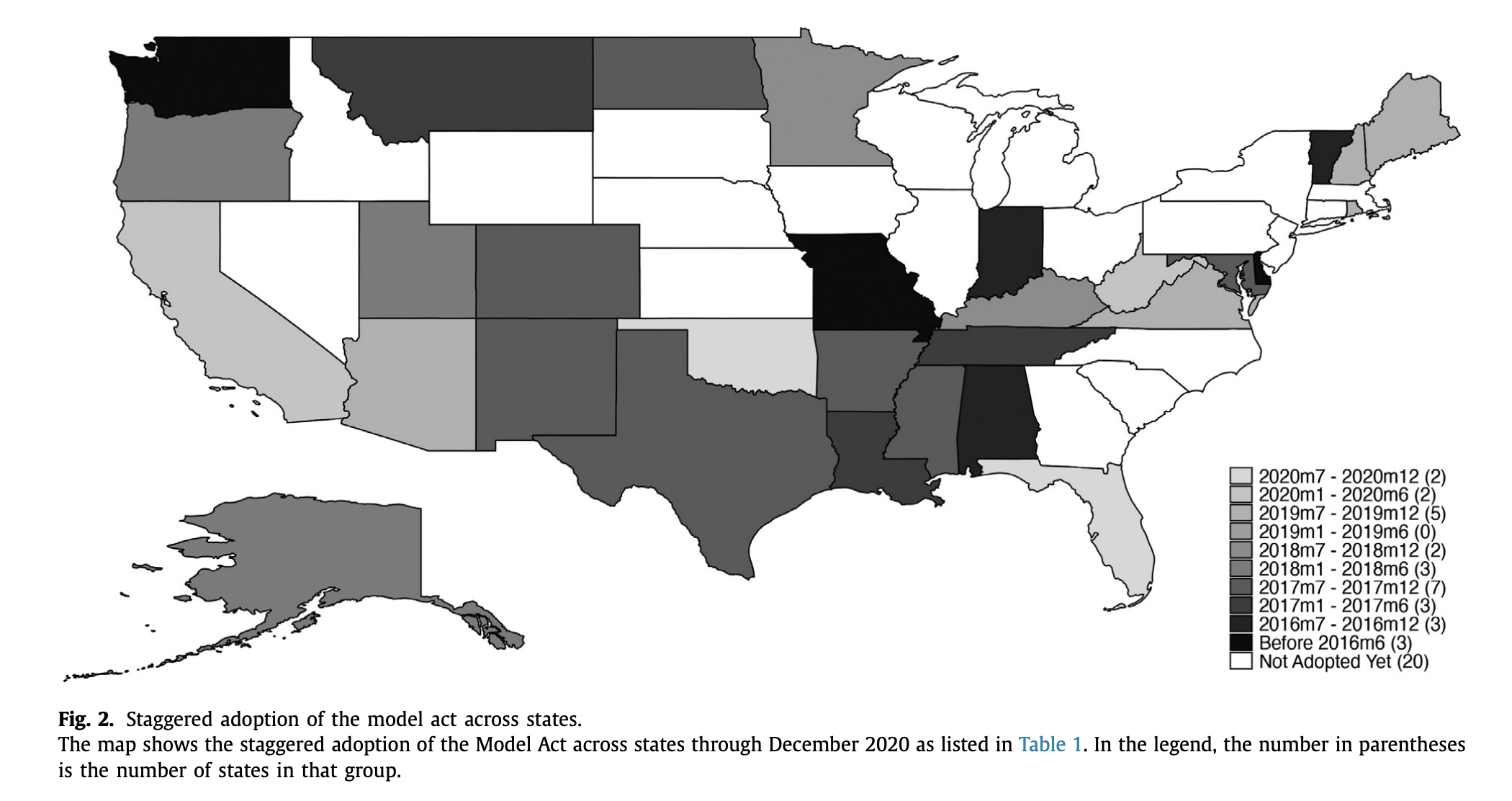
A Quiet Shift in Power
For years, strict privacy laws made it difficult for financial professionals to intervene when they noticed something suspicious. Even when a client appeared confused, coerced or exploited, advisers had little recourse — once the money left the account, it was usually too late.
The Model Act changed that. In states where its provisions were adopted, broker-dealers and investment advisers gained the authority to delay disbursements from a senior’s account for up to 15 to 25 days if they suspect fraud. They could also reach out to a designated “trusted contact” to share concerns about mental and physical health status — without violating privacy laws.
This legislative shift may seem small, but it gave financial professionals something they hadn’t had before: permission to act. “You don’t always need mandates to make a difference,” says Carlin. “Sometimes, just giving professionals the legal cover to speak up can stop harm before it happens.”
Tracking the Impact
To test whether these new powers have made a difference, the researchers analyzed cases of EFE in all 50 states between 2014 to 2020. They compared states that adopted provisions of the Model Act with those that did not, using two key data sources:
- Reports filed by financial professionals to the U.S. Treasury’s Financial Crimes Enforcement Network (FinCEN)
- State-level crime data from the FBI’s National Incident-Based Reporting System (NIBRS)
“You don’t always need mandates to make a difference,” says Carlin. “Sometimes, just giving professionals the legal cover to speak up can stop harm before it happens.”
The findings were striking. In states that enacted the Model Act, reports of elder abuse by financial professionals declined, reducing the average level of misconduct by 15% compared to the mean level of abuse.
The effect was strongest in counties with a high concentration of financial professionals, especially those working at large bank holding companies. The researchers concluded that giving advisers room to act — without pressuring or penalizing them — made them more willing to speak up and intervene.
Who Benefits — and How?
The researchers found that the policy’s benefits weren’t evenly distributed. Seniors who were more socially isolated — those with fewer connections (based on Facebook’s social connectedness index and the number of religious institutions per capita) — saw the biggest drop in EFE. Less likely to have someone else watching out for them, these individuals were most helped by a vigilant financial professional.
Certain types of financial products also saw sharper declines in abuse. Cases involving debit cards, credit cards, wire transfers and personal checks fell significantly. But fraud related to products with more built-in safeguards, like home equity lines of credit or insurance claims, didn’t change much.
In short, the Model Act has had the biggest effect where vulnerabilities are greatest.
The Power of Permission
So why did a law with no teeth make such a difference?
According to the researchers, it comes down to timing and deterrence. By allowing advisers to flag issues early, states gave them the tools to stop abuse before it escalates. And that early action makes reporting less necessary down the line.
There’s also a chilling effect. When families learn about these protections in conversation with advisers or during the process of naming a trusted contact, they may think twice before trying something unethical. The presence of a potential witness can be enough to deter abuse.
Crucially, the researchers found no evidence that financial professionals misused their new authority. For example, they did not see an increase in customer complaints against advisers. And regulatory actions against advisers did not increase in states that adopted the Model Act, suggesting the law’s safeguards were effective.
A Model With Broader Potential
The study offers a rare bit of good news in the fight against elder financial abuse — a growing and deeply personal threat for many families. It also adds nuance to the often cynical narrative around financial professionals.
“Often, there’s a dark characterization of advisers, especially when it comes to their relationships with older clients,” says Umar. “But this shows that when you empower them to help, many do.”
The researchers believe the success of this “permissive” model could apply to other professions and policy areas, especially where vulnerable clients rely on experts, such as law, healthcare or social work. Giving professionals a green light to intervene, without mandating action, may strike the right balance between empowerment and overreach.
“Sometimes privacy laws meant to protect people can have the opposite effect,” Umar adds. “This shows how small shifts — just giving someone permission — can create meaningful change.”
Written by Deborah Lynn Blumberg
Carlin, Umar, and Yi (2023). “Deputizing Financial Institutions To Fight Elder Abuse,” Journal of Financial Economics.
Never Miss A Story
You May Also Like
Keep Exploring
How the MBA Took Diego Pedrazas from Engineering to Finance
Diego brought five years of engineering experience at Shell into the Rice MBA, pivoting to finance post-grad. He shares valuable insights and advice for MBA students looking to chart their own transformative career paths.


This article was originally published on Clear Admit.
Meet Diego Pedrazas, a recent graduate of Rice Business and a rising leader in the renewable energy investment space. Originally from Bolivia, Diego brought five years of engineering experience at Shell into the MBA program at Rice University, where he focused on finance to pivot into strategic and deal-focused roles. Now serving as a mergers & acquisitions and investments associate at energyRe, Diego reflects on how his MBA prepared him to navigate high-stakes transactions and align his technical background with broader business impact. From leveraging an internship into a full-time role to navigating the transition from oil and gas to renewables, Diego shares valuable insights and advice for MBA students looking to chart their own transformative career paths.

Why did you choose to attend business school?
I attended business school because I wanted to move beyond technical roles and take on strategic, finance positions. An MBA equips me with the business and financial skills to complement my engineering background, allowing me to make a bigger impact.
Why Rice Business? What factors figured most prominently into your decision of where to attend?
Rice Business has a strong reputation for its connections to the energy sector and finance industry, particularly in Houston, which is a global energy hub.
What about your MBA experience prepared you for your current career?
My MBA gave me a solid foundation in finance and strategy to better analyze deals and structure transactions, and it provided the base to start my M&A career.
What was your internship during business school? How did that inform your post-MBA career choice?
I interned for the CEO at energyRe, where I gained direct exposure to renewable energy finance, strategy and top leadership. Working on a capital raise gave me hands-on experience in high-stakes transactions, solidifying my interest in deal-making and shaping my post-MBA path in M&A.
Interested in Rice Business?
Why did you choose your current company? What factors figured most prominently into your decision of where to work?
My internship at energyRe gave me a firsthand look at its leadership, vision and approach to complex transactions. The chance to continue working in a fast-growing, impact-driven company with exposure to high-level deals made it the perfect place to continue building my M&A career.
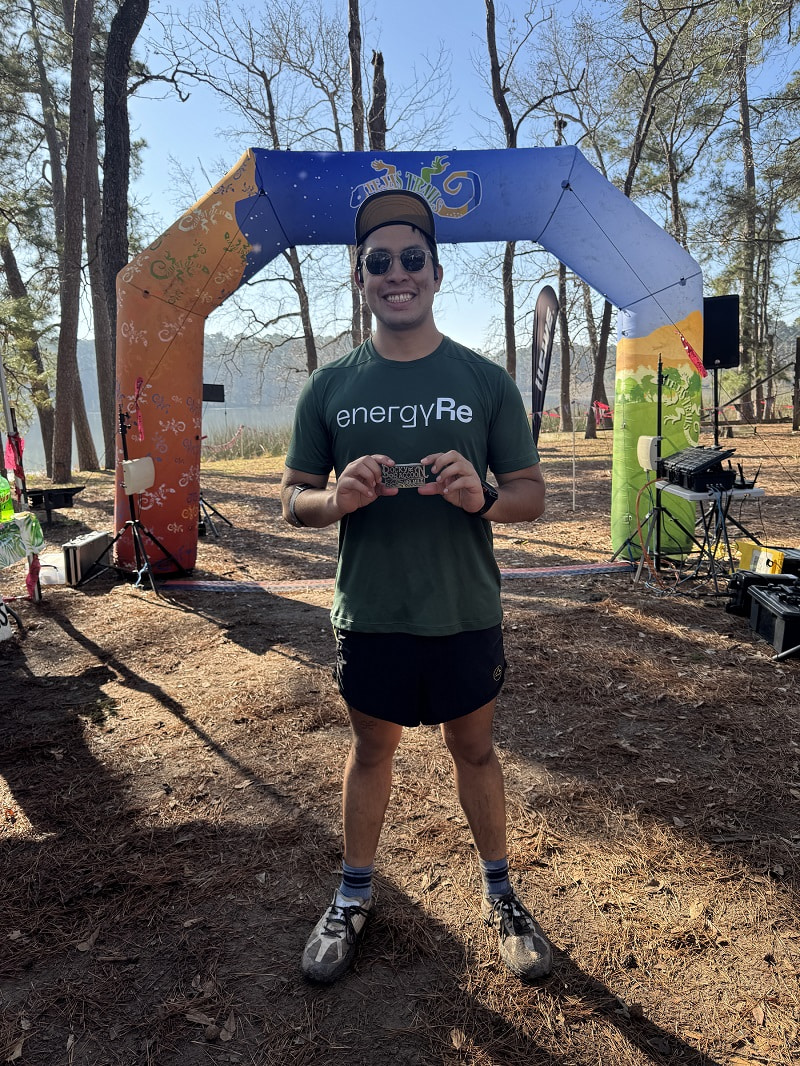
Advice to current MBA students:
One thing you would absolutely do again as part of the job search?
I would leverage my internship to build strong relationships and gain meaningful experience. Doing this played a key role in securing my full-time role and gave me valuable exposure to leadership and strategic decision-making.
One thing you would change or do differently as part of the job search?
I’d stress less and trust the process — opportunities come together when they’re meant to. At the same time, I’d invest more in MBA friendships; the job will come, but those relationships last a lifetime and shape your career in unexpected ways.
Were there any surprises regarding your current employer’s recruiting process?
Since I interned at energyRe, my transition to a full-time role was more organic. The biggest surprise was how much influence informal interactions and demonstrated initiative had in securing the offer.
What piece of advice do you wish you had been given during your MBA?
Don’t just focus on landing a job — focus on finding the right fit. The best opportunities come from aligning your skills, interests and long-term goals with a company’s culture and vision.
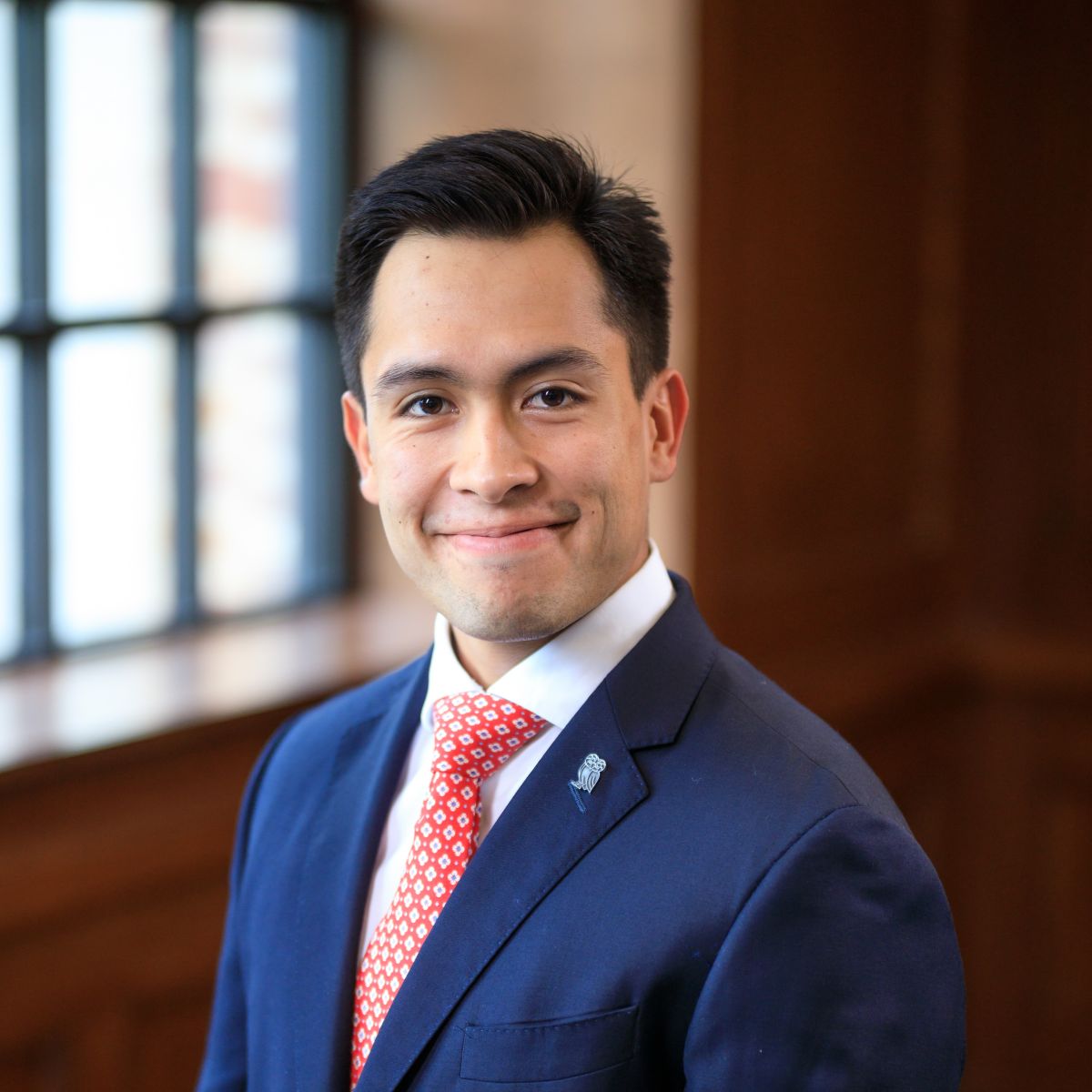
Get to Know Diego Pedrazas, Full-Time MBA
Age: 30
Hometown: Santa Cruz, Bolivia
Undergraduate Major: Petroleum Engineering
Pre-MBA Work Experience: Drilling engineer, Shell
Post-MBA Work Experience: Mergers & acquisitions and investments associate, energyRe
You May Also Like
Keep Exploring
‘It’s never the right time until you make it the right time’: MBA graduates take flight
More than 500 MBA graduates crossed the stage May 9 at the Jones Graduate School of Business MBA commencement ceremony in Tudor Fieldhouse. The ceremony marked the graduation of the 10,000th student from Rice Business.
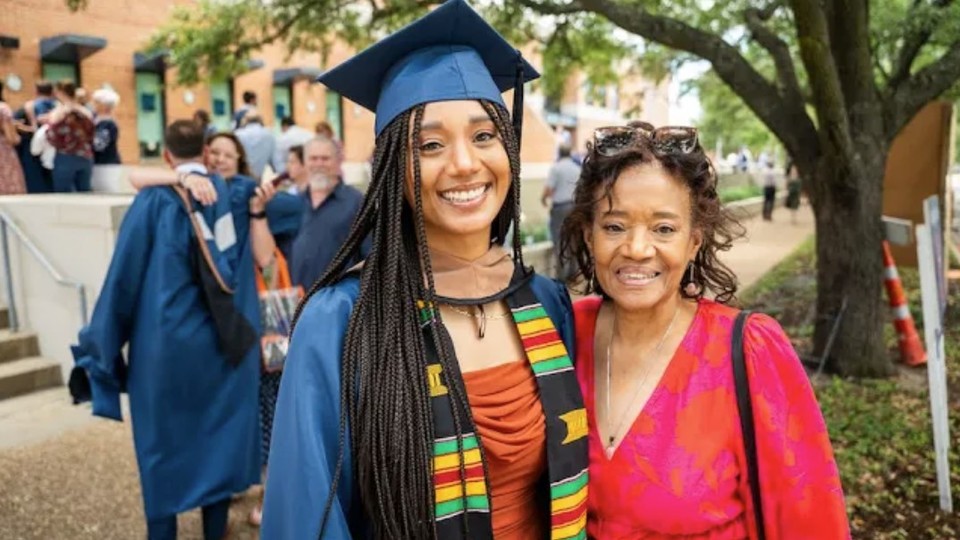
Rice Business celebrates 10,000th graduate in school’s history
“It’s never the right time until you make it the right time.”
It’s a feeling Denise Buckley ’25 knows well. As a proud mother, she raised her children and watched one of her daughters, Brianna, graduate from Rice Business in 2022 with her Master of Business Administration. But this year, it was Denise’s turn.
She was one of more than 500 MBA graduates who crossed the stage May 9 at the Jones Graduate School of Business MBA commencement ceremony in Tudor Fieldhouse. The ceremony marked the graduation of the 10,000th student from Rice Business.
“That’s 10,000 leaders who have walked the path before you and whose work you now can join, shape and carry forward,” said Rice Business Dean Peter Rodriguez.
Diplomas were presented to students from the school’s six different MBA programs, including the first graduating class of the hybrid MBA program, which blends weekly online coursework with in-person sessions throughout the semester for working professionals. Kyle Neff ’25 of Oklahoma City graduated with his hybrid MBA and said he was only able to attend a school like Rice thanks to its unique program.
“I needed the perfect balance of an online offering but mixed with that in-person networking and on-campus experience,” Neff said. “The hybrid MBA was the first program that I saw that accomplished both of those things, and it was world class.”
Rice President Reginald DesRoches congratulated Neff and his fellow graduates on their many accomplishments.
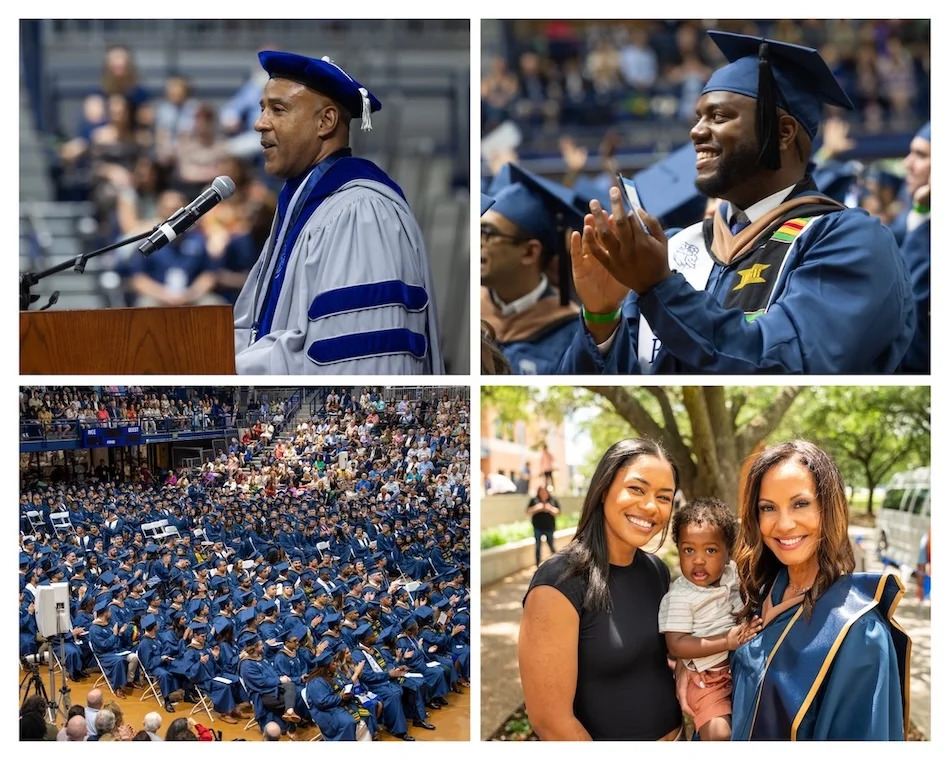
“Earning an MBA is an extraordinary feat, especially at Rice,” he said. “It takes drive, curiosity and willingness to learn and lead in uncertain, ever-changing times.”
Commencement speaker Al Danto shared his inspiring story of recovery from surgery for an optic nerve tumor, which was unexpectedly followed by a pulmonary embolism that nearly ended his life. He advised graduates to take care of themselves mentally and physically, make the most of every opportunity and look for meaning in their professional pursuits.
“Life is short. We’re not promised tomorrow,” said Danto, a senior lecturer in entrepreneurship at Rice. “Find something that gives you a purpose that is bigger than yourself, a reason to stay beyond a paycheck.”
He also urged the graduates to lean on their fellow alumni for support following commencement.
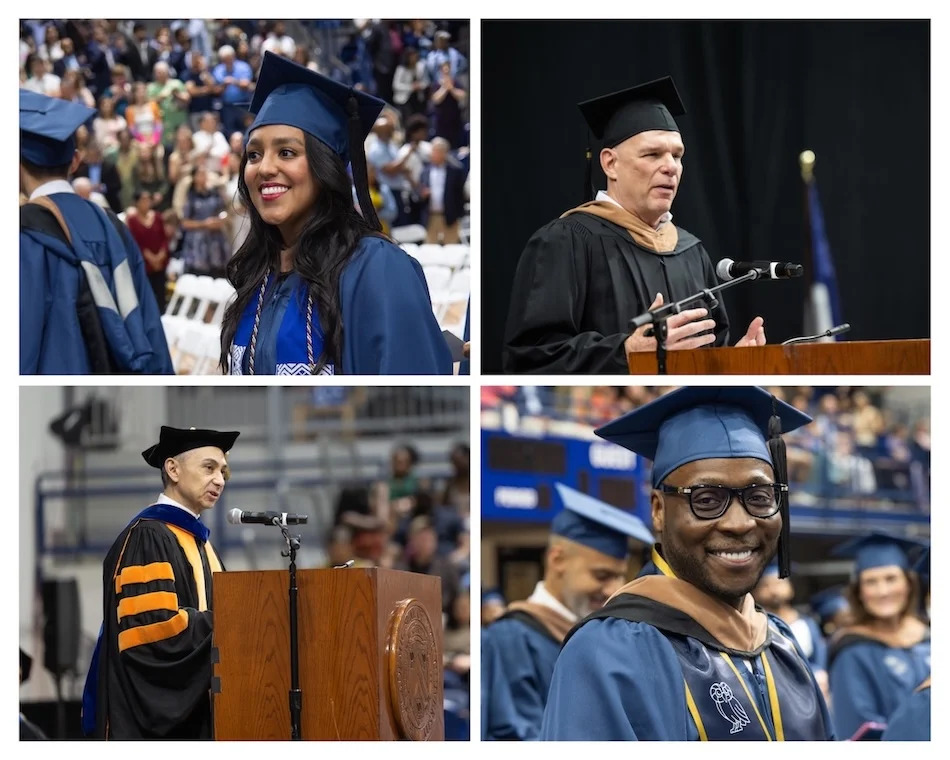
“You’re not leaving Rice Business,” Danto said. “You’ve earned and are moving to the alumni family for life. This family, your classmates, professors and this community, will be there in good times, and more importantly, they will be there in the challenging times.”
Denise Buckley was just one of the graduates who lauded her “second family” — her fellow MBA alums, whom she described as “a tribe of extraordinary people.”
“The camaraderie with them has been transformative,” she said. “The bonds we’ve forged will outlast our time at Rice, creating a network that feels more like lifelong allies than professional connections. In many ways, what I’ve learned from them has been just as profound as anything in our textbooks.”
And speaking of family, Buckley said she couldn’t be more proud to share her Rice connection with her daughter.
“Sometimes I catch myself marveling at how rare this shared experience is,” she said. “How many mothers and daughters can say they have walked the same halls, tackled the same curriculum and earned identical degrees from an institution as prestigious as Rice? In a very real way, Rice has become woven into the fabric of our family story, not just as a university we both attended but as a living link that bridges our individual journeys and creates a shared legacy we will always carry with us.”
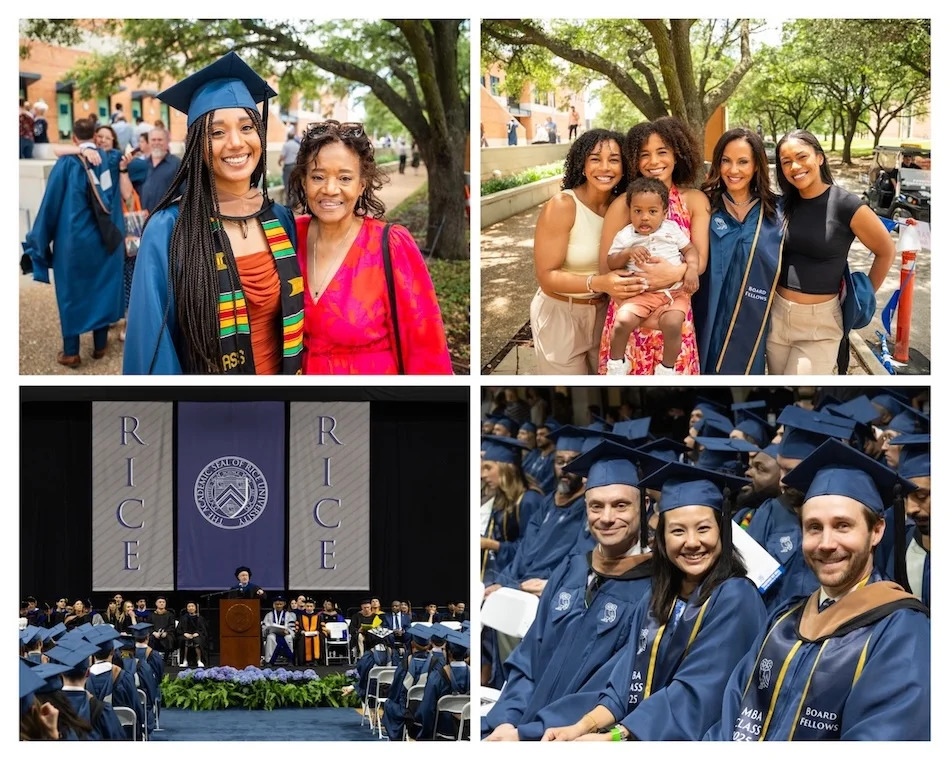
The graduation ceremony also included the presentation of the annual M.A. Wright Awards, which are nominated by the class and given to well-rounded, exemplary graduates across all of the MBA programs to honor their outstanding academic performance, selfless leadership, community stewardship and career progress. The winners this year included:
- Full-time MBA: Husein Lokhandwala
- Executive MBA: Sharbel Haddad
- Professional MBA – evening: Zunaira Zaki Desai
- Professional MBA – weekend: Lucas Spangler
- MBA@Rice: Andria Monique Pourkarimi
- Hybrid MBA: Kyle Neff
The Faculty Teaching Excellence Awards are conferred upon faculty members selected by the graduating class to honor professors in each program for their commitment to Rice Business’ mission of creating community and excellence.
- Full-time MBA: Utpal Dholakia
- Executive MBA: Prashant Kale
- Professional MBA – evening: Haiyang Li
- Professional MBA – weekend: Tarik Umar
- MBA@Rice: Sharad Borle
- Hybrid MBA: Vikas Mittal
The 2025 Alumni Teaching Excellence Award was presented to Brian Akins. The annual award is selected by alumni who graduated two and five years prior.
Visit the 2025 commencement photo gallery here, and use #RiceGrad2025 to tag your photos and posts on social media.
Photos by Jeff Fitlow and Brandon Martin. Video by Brandon Martin.
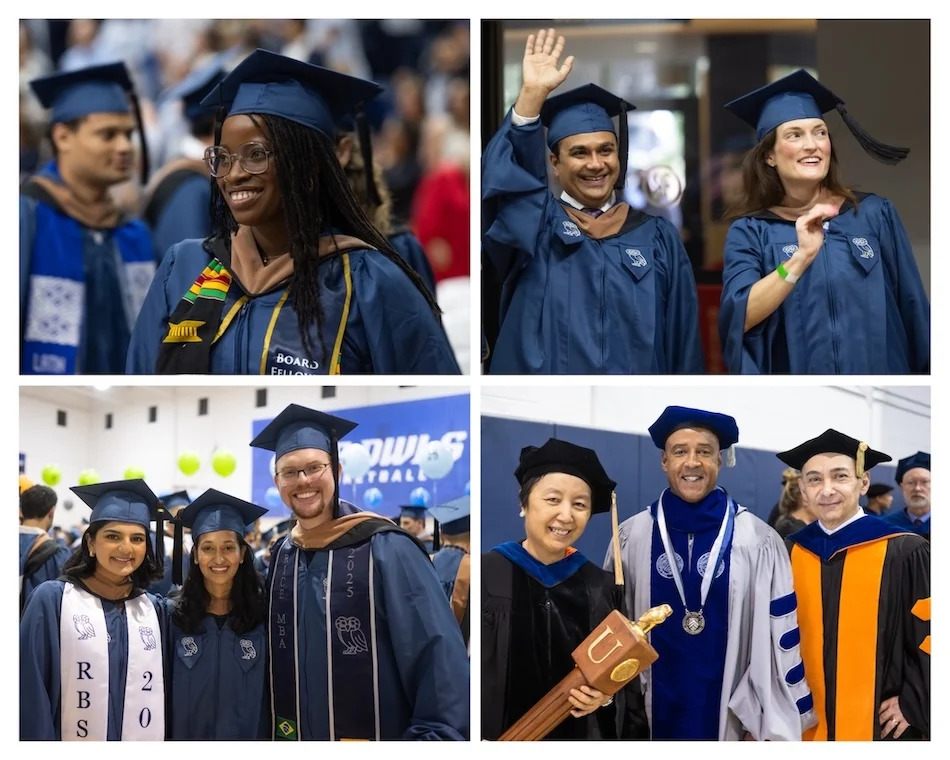
You May Also Like

Rice University’s Jesse H. Jones Graduate School of Business today announced the launch of its Graduate Certificate in Healthcare Management program, a 10-month, credit-bearing professional credential designed for current and aspiring leaders seeking deep expertise in the business of healthcare.
‘Creating new knowledge:’ Rice congratulates more than 250 doctoral graduates
Rice University conferred more than 250 doctoral degrees during its 112th commencement May 10 at Tudor Fieldhouse. Doctoral candidates along with friends, family and loved ones gathered for the ceremony, which included the awarding of doctoral regalia, congratulatory remarks, cheers and a few moments to reflect on this milestone.
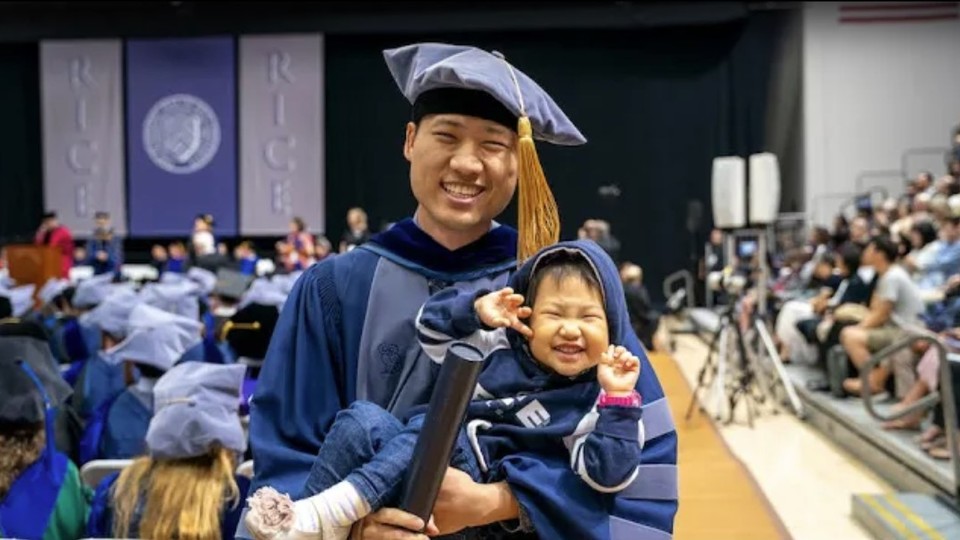
Rice University conferred more than 250 doctoral degrees during its 112th commencement May 10 at Tudor Fieldhouse. Doctoral candidates along with friends, family and loved ones gathered for the ceremony, which included the awarding of doctoral regalia, congratulatory remarks, cheers and a few moments to reflect on this milestone.
“A doctoral degree is one of the most demanding and rewarding journeys a person can undertake,” President Reginald DesRoches said. “It’s not about publishing papers or completing fieldwork. It’s about creating new knowledge. It’s about pursuing questions no one else is asking and answering them in ways that move humanity forward.”
DesRoches emphasized that doctoral degrees demand the highest intellectual rigor, and they require curiosity, creativity, grit and resilience. Similar sentiments were shared by Amy Dittmar, the Howard R. Hughes Provost and executive vice president for academic affairs.
“In your doctoral studies, you have benefited from personalized, holistic education while engaging in real world experiences and groundbreaking research,” Dittmar said. “These amazing opportunities, and you’ll have many more over your career, come with a responsibility to use what you’ve gained to benefit others. You have what it takes to improve human health; steward environmental resources; invent new technologies; create beautiful music, art, literature; teach others and transform education while you build inclusive workplaces, shape public policy and so much more.”
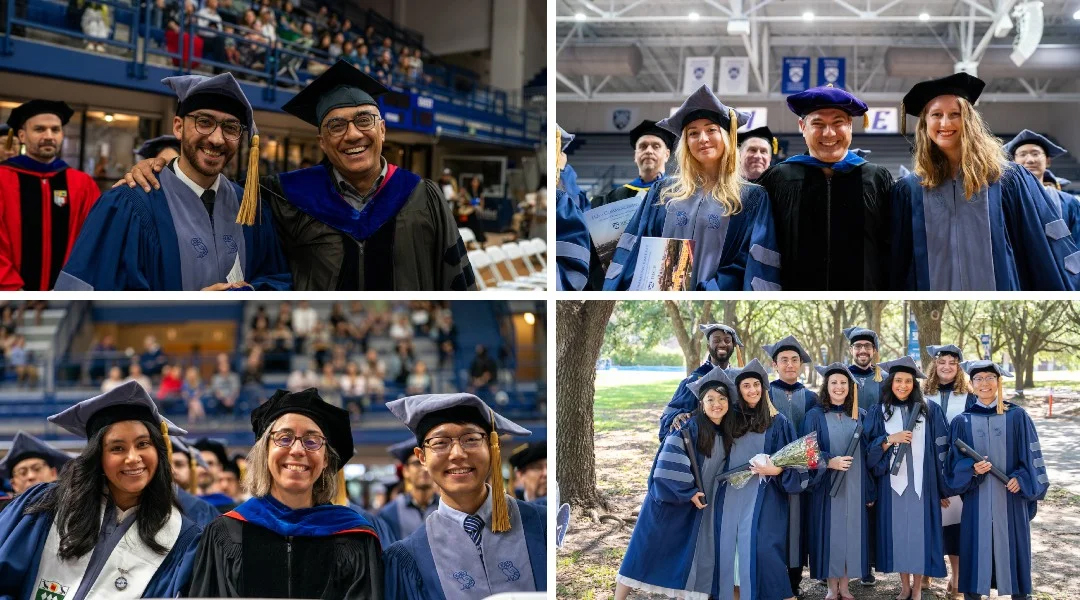
The excitement to reach this finish line was palpable throughout the day. Andrew Torma, whose degree is in applied physics, summed up his thoughts on this momentous occasion.
“This is crazy, because I never thought I would do this,” Torma said. “After I finished my undergrad at William and Mary in physics chemistry, I needed a break from research, but then I had a mentor in my hometown who convinced me. He said, ‘If you want to have the impact you want to have, STEM is your place. You need to go do more.’ The 5 1/2 years here at Rice were amazing. The applied physics program, being the interdisciplinary program it was, supported me academically and also psychologically throughout it all. It was just phenomenal.”
Chaney Hill, whose degree is in literature, reflected on her journey into the doctoral degree. Like many students, her plans and mission evolved over time as she progressed through her studies, which led her to a different outcome than she originally anticipated. It also taught her about resilience during times of change.
“When I first came here, I had a very specific idea of what I wanted to do, the kind of research that I wanted to engage in and the kind of scholar I wanted to be,” Hill said. “And since then, that’s changed a lot. I think the decision to change courses was a difficult one in the moment, but ultimately, it helped me become the scholar I am today. I’m very grateful for that. It gave me the courage and the reinforcement to be able to make that decision.”
The loudest cheers of the ceremony came when Dasom Kim, who studied applied physics, took the stage holding his 2-year-old daughter. With child in hand as he earned his hood, his daughter had a special shirt made for the event with its own hood.
“I feel very special having a child during my thesis, and having her here today, I hope my child feels something special too,” Kim said. “I hope this inspires her to follow her own dreams as an adult.”
To view images from the ceremony, visit rice.photoshelter.com/galleries/C0000bpNW1770DeA/Commencement-25. Share photos and posts using the hashtag #RiceGrad2025.
You May Also Like

Rice University’s Jesse H. Jones Graduate School of Business today announced the launch of its Graduate Certificate in Healthcare Management program, a 10-month, credit-bearing professional credential designed for current and aspiring leaders seeking deep expertise in the business of healthcare.
Work Smarter With AI feat. Summer Husband ’02
Season 5, Episode 7
Summer discusses the evolution of AI and the power of pairing machine learning with human judgment.
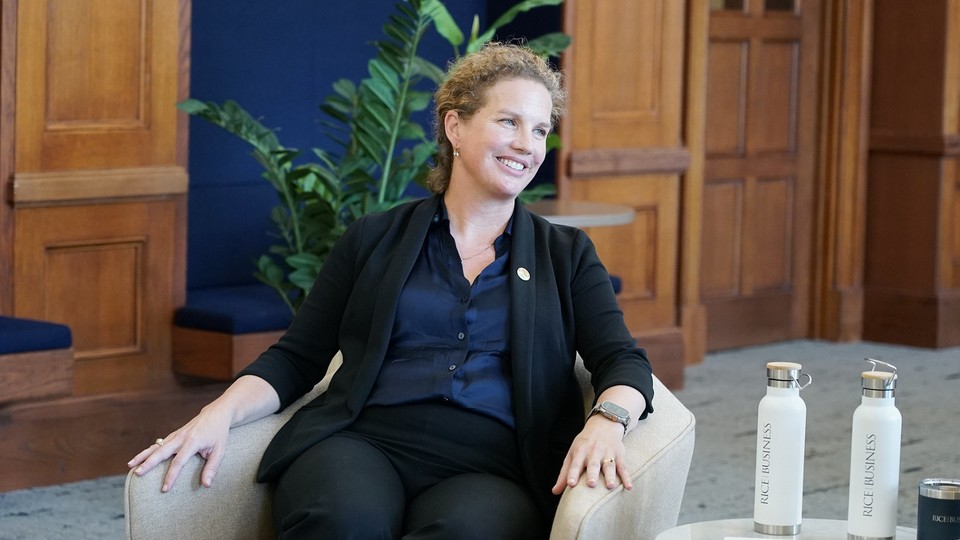
Owl Have You Know
Season 5, Episode 7
With a Ph.D. in computational and applied mathematics from Rice, Summer Husband ’02 has been at the forefront of AI and data innovation for years.
From transforming how the U.S. Navy uses machine learning to now leading data products and applied intelligence at Worley, her career bridges complex tech and real-world impact. Following her workshop, Unleashing Your Inner Cyborg, at this year’s Women in Leadership Conference, Summer joined Owl Have You Know co-host Brian Jackson ’21 to discuss the evolution of AI, the power of pairing machine learning with human judgment, and the ethical guardrails she believes are essential in today’s data-driven world.
Watch
Listen
Subscribe to Owl Have You Know on Apple Podcasts, Spotify, Youtube or wherever you find your favorite podcasts.
Episode Transcript
-
[00:00]Brian Jackson: Welcome to Owl Have You Know, a podcast from Rice Business. This episode is part of our Flight Path Series, where guests share their career journeys and stories of the Rice connections that got them where they are.
Joining us today is Summer Husband, a Rice Ph.D. Thank you so much for being here, Summer.
[00:17]Summer Husband: Thanks so much for having me.
[00:19]Brian Jackson: Well, great. Well, we're here because of the Women in Leadership Conference. You were hosting a workshop, or on a workshop. Could you tell me a bit about what you were working on?
[00:29]Summer Husband: Yeah. So, I had the fantastic opportunity to co-present a workshop with one of the Rice MBA school professors, Kathleen Perley, who is incredibly talented. And we spoke together about unleashing your inner cyborg and also addressing the ethics of AI. So, we spoke some about just how to empower women in their roles by really leaning in with AI, but to do that in a very mindful way, addressing the ethics and the risks that go with these very powerful tools.
[01:03]Brian Jackson: I feel like, every conversation with AI, you're on the cutting edge, because it's progressing so quickly and we're trying to all catch up. So, when you look at it in terms of ethics, you know, is it a broad definition? How are we trying to define it?
[01:18]Summer Husband: Yeah. So, that's a great question. And just laying the groundwork, too. You're absolutely right. It's not just hype that it's changing very quickly. The technology is changing so rapidly. When we look at our pipeline of AI use cases at Worley, there are things that we had tagged as not technically feasible a few months ago, last spring, last summer that now are feasible. The technology is just changing really quickly, which makes this a very exciting space to be in, but it makes it really challenging around ethics.
One of the other, I think, challenges in this space is, because it's fairly new, it's changing rapidly, so the technology is changing rapidly. The legal landscape is changing really rapidly, also. So, some of the partners that we tend to go to for playbooks in these spaces don't have a fully baked playbook in this space. A lot of organizations are needing to define and figure out their approach to ethics and AI together.
So, at Worley, we're approaching that with a pretty comprehensive approach that includes our AI experts, of course, our legal experts. We want to ensure that we've got our operations involved in that. They're the ones that are, you know, boots on the ground and are going to be using these tools. We've had to cast a pretty wide net, but we've had to do a lot of discovering and shaping for ourselves.
[02:44]Brian Jackson: So, I mean, AI can move at warp speed. It seems like the human factor is the part that's going to slow down the progression. You know, is that what you're finding? And I guess, in terms of getting to answering these questions about, okay, these are the limits in terms of ethics, you know, are we able to keep the pace? Are you able to keep the pace?
[03:05]Summer Husband: Yeah. So, there definitely are some roadblocks in keeping pace. And the risk and the ethical concerns is one of those. But I would say, also, having the right skill set in your workforce and upskilling your workforce — that's a challenge. There's a real opportunity for people who know their business very well and do the work to learn how to deploy AI in their field, in their area. It's that combination of skills. I think there are a lot of very smart people doing very smart things to build really amazing technology. What I think a lot of businesses have challenges with and where we face a bit of a roadblock is, how do you deploy those tools well in a breadth of different businesses?
So, also, it makes sense. It's an opportunity for people who are willing to, kind of, lean in and take a risk there to differentiate themselves.
[04:06]Brian Jackson: So, when you talk about upskilling, could you give me a bit of an example of that?
[04:10]Summer Husband: Yeah. So I'll give one great example. So, we just deployed something called the Sales Response Generator. So, it's a generative-AI-powered tool that our sales team uses to automate a lot of the process of responding to an expression of interest. So, we'll get an expression of interest from an organization, and we have very little control over the format. So, that could come as a PDF. It could come as an Excel. It could come as a Word. And we previously had a lot of repeated activity in going to gather, what are the documents that I need to respond to this? You know, what's the specific question that's being asked? Okay. Where have we done this before? A lot of hunting and gathering.
But it's repetitive. So, we built a generative-AI-enabled tool that automatically generates the first-draft response to an expression of interest. And then we have a human come in and refine that, to review and refine that product.
Well, for this tool to be successful, we needed… there's no way the AI team is not going to build this on their own without very active ownership and involvement from the sales team. We're actually really fortunate. Actually, it's a Rice MBA grad, Luis Rodriguez, who has been one of the business owners of this process in our organization. But he is curious and wanted to figure out how to better deploy AI for his team.
And that's really exciting. I think it's one of the things I enjoy most about my job. I love working with the technical people on my team. They're incredibly talented. I also really love working cross-functionally with folks in different business areas. So, that, you know, entrepreneurial mindset can be a huge enabler for organizations.
[06:06]Brian Jackson: When I think about your Ph.D. in computational applied mathematics to, all of a sudden… Not all of a sudden, but to a progression of vice president of data products and applied intelligence. I mean, one, your role, probably, was it around 20 years ago, 15 years ago?
[06:23]Summer Husband: No, the work that… and I like to point this out, Brian, that the work I was doing, really good work right out of my Ph.D. program at Rice in the Department of Defense space, the work that we would essentially get problems that didn't have an out-of-the-box solution. And it was our job to say, “Okay, what's the… to, kind of, structure the problem and figure out what's the right approach?”
The right approach, very often, was a machine learning algorithm. Well, 20 years ago, the entire job was to, okay, identify what's the machine learning algorithm and then to code that up. Well, that whole process has been automated, you know, at this point, that, you know, what was my entire job that I think was very valuable and I'm very proud of has been automated for years, so that, you know, you can't get married to the details of your current job. Just technology is going to change things. So, I think I've veered from your original question.
[07:18]Brian Jackson: No, no. It's a great response, because I mean, to me, it's just everything I talk about in terms of… I'm in the energy world, so data centers come up. I might as well just get it tattooed on my forehead. We talk about it so much. And that conversation has changed in six months. And the technology we're talking about, the computational power, the energy usage, water usage, I'm on the outskirts of it. I'm seeing the data centers that are, you know, housing the AI and allowing for that computational power to actually be there and available, but know nothing about what's actually machine learning.
[07:58]Summer Husband: It's a fascinating… it, really, is a fascinating space. And the speaker in the keynote this morning, she was fantastic, but she was encouraging the audience to get a minor in AI, across the board. No matter what you're doing, you need to get a minor in AI. It's going to impact your job. It's going to be… you're going to be much more empowered in your role if you're identifying, “how does AI impact my role?” You know more about your job than 99% of the world does. You are much better placed to figure out how to deploy AI to supercharge your role than anyone else does.
[08:34]Brian Jackson: So, leveraging it to be more valuable. If it can write emails for me that don't necessarily require me to sit there and sweat over for two hours, maybe I should be doing it. Is that a better use of company time?
[08:48]Summer Husband: Yes. 100%. You could even write them in the format of a poem.
[08:51]Brian Jackson: You know, I have asked AI to write an email and I said, “Do it in the style of Hemingway.” It was a great email.
[08:57]Summer Husband: I love it. Yeah, that's a joke. But seriously, I have colleagues who've said, this is actually… it's really impacted their jobs. They've struggled over adding enough emotional connection in email and they've offended people without meaning to, and that being able to write the bullet points of an email and then ask AI to, like, make it nice has actually impacted, you know, their careers.
[09:21]Brian Jackson: Empathy up.
[09:22]Summer Husband: Yes, up the empathy. Yeah, I need that chip in all my voice, up the empathy.
[09:28]Brian Jackson: So, you, kind of, hinted on a bit, and I'd love to chat about, you know, your work with the U.S. Navy Airborne Laser Mind Detection System program. What was the genesis of working on that project? And, I guess, looking at the technology from then and looking at now, you know, what are some of the lessons learned?
[09:48]Summer Husband: So, that's one of my favorite projects that I worked on. So, essentially, this was… so, first, the organization that I was with Metro, it's the job that I got right out of grad school. They hire a lot of Ph.D.s in math and computer science and are continuing to do some really fascinating work.
The problem there was you needed to be able to automatically detect mines. What it looked like at that, you know, this was 20 years ago, before ships were navigating a particular area, they'd have helicopters that scan to try to pick up, are there any mines in the area? And you had a human that would look at thousands and thousands of photographs to say, “Yes, this is a mine. No, this is not a mine.” And the false alarm rate was extremely high, so 99.9% of what an operator looked at would be a false alarm.
Humans are not well-suited to that kind of — highly repetitive, you know, very few actual hits. But what was really interesting, and it was a great way to learn about machine learning, machine learning actually wasn't… I did a little bit of it in graduate school. A lot of what you do in a Ph.D. program is learn how to learn. So, I learned a lot about machine learning in that first job. But you would sit down with a human operator who was very good at distinguishing what is a false alarm and what is not, and say, “Okay, what is it about this photo that tells you this is a false alarm?” And they would say, “Well, you know, the white spot is too big.” Then you think, as a mathematician, “Okay, well, how do I quantify that?” Well, that's the amount of light that's covered, you know, in this area. You know, how can I automate that and make that a quick measurement that comes off of…
[11:34]Brian Jackson: So, you give it parameters, right?
[11:35]Summer Husband: You give it some parameters. And that's a feature of machine learning. What we just did is identify a feature of a machine learning algorithm.
Another one was the brightness of the spot compared to the depth that was detected at. Again, you can compare how bright is this spot, how deep was it detected? And again, that's another filter that you can put on.
So, the process, I really loved that the process of talking to a human operator, understanding what is their work, what is their world, understanding their expertise, and then figuring out, how do I automate that to make your life better?
[12:10]Brian Jackson: And that's what it is. I mean, you're automating it to make life better. Because imagine the work before. It sounds awful. You're looking at thousands of images, and you're just trying to pick which one may or may not be, and then someone else is going to look at that image, right?
[12:24]Summer Husband: There's better work for humans to do, yes. And that's a lot of what we're doing with AI. I'm going to be honest about it. There's some spaces that cause me concern, that cause a lot of people concern. But there are a lot of places where we can bring in AI and automation to automate tasks that are better suited to a machine and that free up humans to do higher level and more rewarding and satisfying work.
[12:48]Brian Jackson: What would be those areas that cause concern for you?
[12:51]Summer Husband: Oh, anything that… you know, we are in the… I'm in the engineering field. We've got to work in first principles. So, when we get to… we're starting to… we're leaning in more on some AI use cases that have to do more with the core of our business. We can't take… there are a lot of things we can't take a probabilistic approach to. First principles physics is really important. So, making sure you have the right… that you're grounded in physics, where that's really important and where you're building actual physical things, is an area that we pay a lot of attention to.
Now, that's an area of some exciting research. So, physics-based AI is an area that's really growing. There's some fascinating research that's handled that's happening in that space. So, that's one that we think about.
And, you know, another area that you always have to be really careful about is, anytime you have AI, making decisions that impact people. With the very best intentions, you can do some really terrible things. So, it's extremely important that you have a very robust approach to AI governance that asks hard questions and gets beyond what was the intent of what you're providing versus what is the capability of what you're providing.
[14:17]Brian Jackson: I've played with AI myself, and ChatGPT, I think, is great. I'll ask it questions, and sometimes the responses aren't great. But when I refine it, give it the rules, give it more background information, I'm seeing the responses improve and improve and improve. So, I mean, do you think, as we continue and it continues to learn and it continues to have new parameters and new information, you know, we're going to be able to rely on these, you know, outputs and say, “Okay, we can make an actual decision on it?” You know, do we get to that point?
[14:49]Summer Husband: Well, I think you're all… well, first, I would say there, what's probably most impactful is your learning as a user. I mean, the models are really increasing in their accuracy, but also our proficiency in being able to deploy them well is also really increasing.
I think we are going to need humans in the loop and in a lot of… in many places, and we'll need to be very thoughtful about where we're doing that. But agentic AI is something that is technology that has really picked up speed, where you're deploying AI as an agent. So, it's taking action. You're not just getting information, it's taking action. So, we're definitely getting to some places where we put more trust in AI. But we're going to need to be really careful and thoughtful about that.
[15:42]Brian Jackson: Yeah. We still need, I call it the human factor. We can call it human intuition. Like, that needs to be a part of it, right? Do you think we ever get to, you know… I guess, really what I want to know is, where do you see human intuition and decision making still holding a strong advantage over AI? Is it just in these situations we're talking about complex problem solving with physics or, you know, actual decision having to be made?
[16:10]Summer Husband: So, first, I think it would be incredibly arrogant for me to say with a lot of confidence, this is absolutely the way it's going to look. You know, even two years from now, I think there's, you know, a lot of room for people to be extremely wrong. But right now, I can tell you the way we're actually deploying AI and some of the challenges that we're seeing where we really need people is coming up with, what are the right problems to solve? What are the interesting areas for us to be pointing AI towards?
That's, you know, a lot of what we were getting at in the session today on, you know, unleashing your inner cyborg and really leaning in with AI, is figuring out where the opportunities are, where to deploy it in your job. That is less explored than you think. I think most people under-appreciate what kind of an open field there is and figuring out where to deploy AI well in your job.
So, asking the right question is something that still is an area where humans have a lot of impact. People will catch up, but I think that you need the right combination of skill set. And I think it takes some intention. We've really… you know, this time a little over a year ago, we had an AI team of seven people that was functioning more as an R&D group. I feel very fortunate to be in an organization with executive leadership and a CEO who identified AI as a critical driver for transformation. He made significant investment in AI. We brought together our strategy group, our subject matter experts in that technical team, to really make a very intentional push and play around AI. We now have a team of 50-plus. It includes those AI experts. It also includes full stack developers. And we're very intentional about how we're partnering across the business.
So, this is what I'm talking about, too, about the right skill set in employees of putting… it's not just building up technical skills. It's putting the right mix of skills together. And I think you can do that more in individuals. I think it's going to be increasingly powerful to have expertise in your field, know your field really well, and have that minor in AI where you can identify, “Hey, this is where I can supercharge what I'm doing with AI.”
And, you know, in my career, some of the… I would say, if I were, kind of, thinking through who were the top five most impactful employees I've been privileged enough to have working on my team, that list is overwhelmingly populated with people who were not AI experts. But although, I want to be fair, my AI experts are fantastic. But the people who know their business really well and understand enough about the technology to be able to help direct, “Hey, no, no, no. This is actually the problem that you need to solve.” I had a really smart team member who helped redirect me on that. I had a model that I was so excited about. You got a very detailed probability curve of, you know, how likely a job was to be filled over time.
You got so much information out of the probability curve. I really was very attached to it. She had to, kind of, come in and say, “Nobody cares about that probability curve and it's actually getting in the way. What they want is red, yellow, green. You're getting in the way.” She said it much nicer than that, but that's essentially what she was saying.
[19:52]Brian Jackson: You’re really attached to this.
[19:55]Summer Husband: I really was. I really like all the information. But, you know, that kind of understanding, she understood the person who was going to be using the output of the model, she understood what they really needed, and she understood the UX, you know, the user experience of what we were doing. So, the technical skills are really important. You do really need that. But there are a lot of other skills that you need to have in the mix.
[20:18]Brian Jackson: It just sounds like humans aren't going obsolete, so we don't have to be afraid.
[20:21]Summer Husband: 100%. Yeah.
[20:23]Brian Jackson: But, you know, it's the truth. I think we're all, like, nervous in how to approach it. And be it ethics, be it your data, your information, the security of your confidential information, like, none of us are exactly sure where it goes out into the data sphere.
[20:38]Summer Husband: And I think it's also the, like, perceived risk versus actual risk. It feels risky. And there's a significant startup cost, I think, to really lean in with it. But it's also a very significant risk to do nothing. But you just don't feel it. It's not felt as much. And it doesn't have the startup, you know, kind of, that initial bump to get over.
[21:01]Brian Jackson: That's a great point. So, I mean, today, being woke, we're here on campus and you're talking about AI with folks, I'm curious, in your workshop, what types of questions were you getting? What's the general feeling around AI? Is it positive? Is it nervous?
[21:18]Summer Husband: Yeah. Well, it's a mix, as it would be in any audience. There were some questions from people you can tell are thinking deeply, who are already doing really cool things, and, you know, trying to figure out how to go from, you know, proof of concept models that they're already building. And how do you put that into production? And what are the right skill sets that you need? I mean, that is so super, super impressive. There's also, you know, some tentativeness that I think is a lot of what we were wanting to address in our session today, of, “Hey, this is an opportunity. Lean in. You don't need to ask for permission.” I mean, you've got to be following, you know, your company's guidelines around safe use of AI, but to show some leadership in that space, it's a huge need. And lean into that, yeah.
[22:10]Brian Jackson: Yeah, I agree. It's an opportunity to lean in. And trying to catch up five years from now, I don't think, is ideal. So, the attendees today, what do you hope that they take? If they could take one thing, you know, from the activity, be it from your workshop or just the conference in general, what's one thing you hope they take away?
[22:31]Summer Husband: So, I think it's really powerful for women to be around other very capable and talented women. I didn't realize what an impact that had. I've loved all the organizations that I've worked for.
My first job, there was only one other woman on the technical side. I didn't think that impacted me. But my next organization had a lot of women in executive leadership. And I suddenly started to feel like taking a more senior role was a possibility for me in a way that I had not… I just hadn't perceived that to be a possibility for me before. And I never would've, you know, connected those dots, but I really appreciate Rice opening up the opportunity for women to hear from other women. There's just a different… it's just a little different when it's mostly women in the room and you feel safe to ask some questions that you just don't feel safe to ask in some other spaces. That's just, kind of, the way that goes. So, I appreciate the opportunity.
I also… you know, someone brought up, there were some questions around imposter syndrome and how to deal with that. And that's something, I think, everyone's dealt with, male or female, women for sure, is something that we, kind of, work through. I've had an approach to that that has worked really well for me. And that's just thinking through, what's the value that I bring in this room? And to be brave and honest about that.
So, sometimes I ask, “Okay, why am I here? What is the value I bring?” And sometimes I have expertise in a space that nobody else has and I need to embrace that, and I need to speak out bravely in the, you know, the area that's my job to speak to. In some other areas, I will feel… I will know I'm out of my depth. Actually, there's a lot more expertise in this space, in this room that I have. And this is an opportunity for me to learn. And that's also okay. That's actually good. If I'm ever in a job where I never feel a little on my back foot sometimes, or a little outta my depth sometimes, then I probably need to look for another job.
So, just that kind of… look at that honestly, and be brave when you need to speak up, and be totally comfortable with the fact that you've got some things to learn when you're in a space where you have some things you need to learn.
[25:05]Brian Jackson: This is the space to do it. And I think you're right, it's hard to envision yourself in a position when you've never seen anyone else like you-
[25:13]Summer Husband: Yes.
[25:14]Brian Jackson: … stand there and take it. And we're so fortunate that we have so many women who have these incredible backgrounds and careers and stories. And, you know, this opportunity to sit down and ask them candid questions, and how do you deal with failure and how do you, you know, sit back and push norms or, you know, challenge the status quo? Like, this is that space. And one, thank you very much for sitting with me and for sharing your story. And yeah, it has been such a pleasure.
[25:45]Summer Husband: Oh, it's been my pleasure, too. Thanks for a great conversation. And I really appreciate the opportunity to speak with you. And it's been a great day at the conference.
[25:54]Brian Jackson: Thanks for listening. This has been Owl Have You Know, a production of Rice Business. You can find more information about our guests, hosts, and announcements on our website, business.rice.edu. Please, subscribe and leave a rating wherever you find your favorite podcast. We'd love to hear what you think. The hosts of Owl Have You Know are myself, Brian Jackson, and Maya Pomroy.
